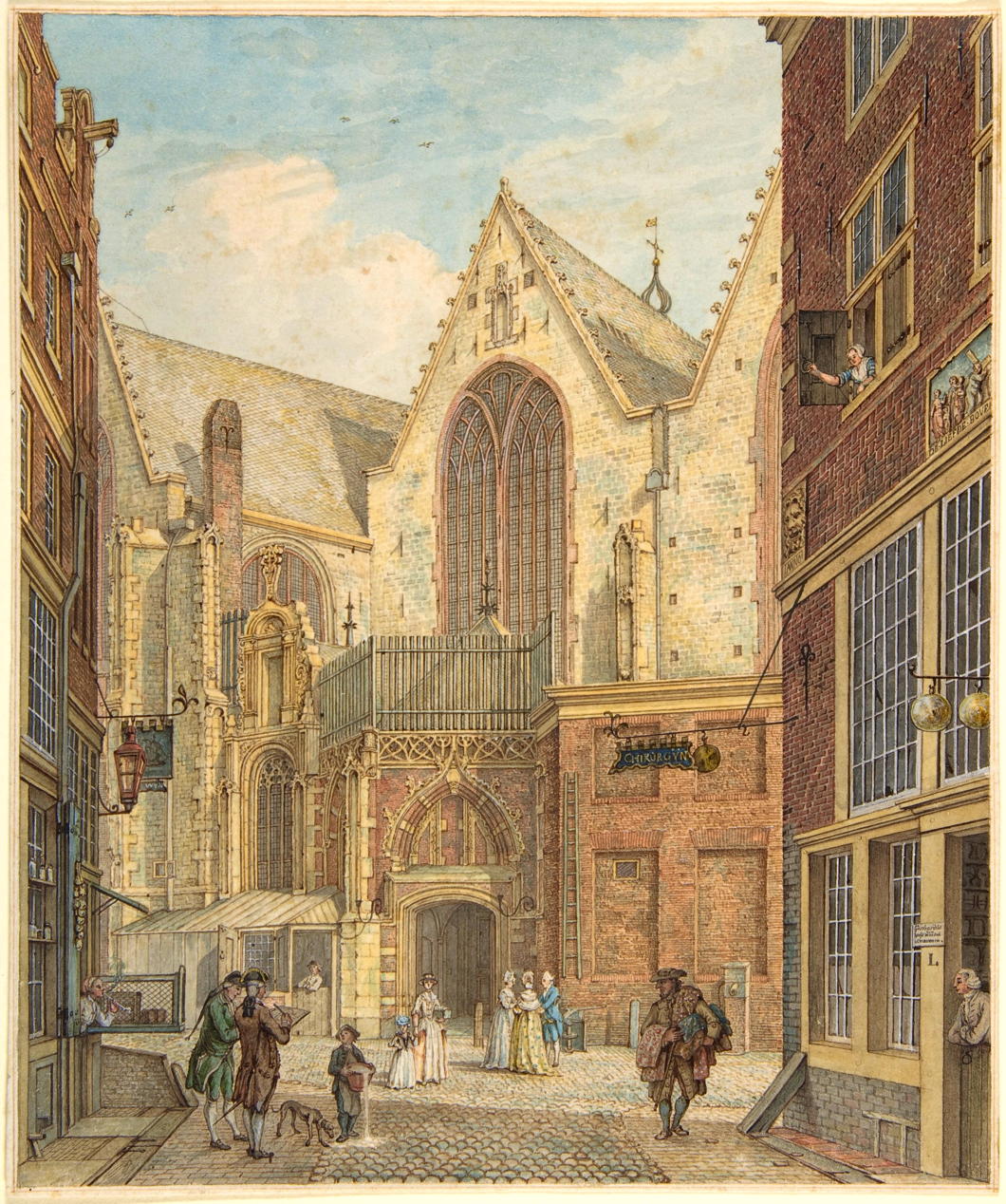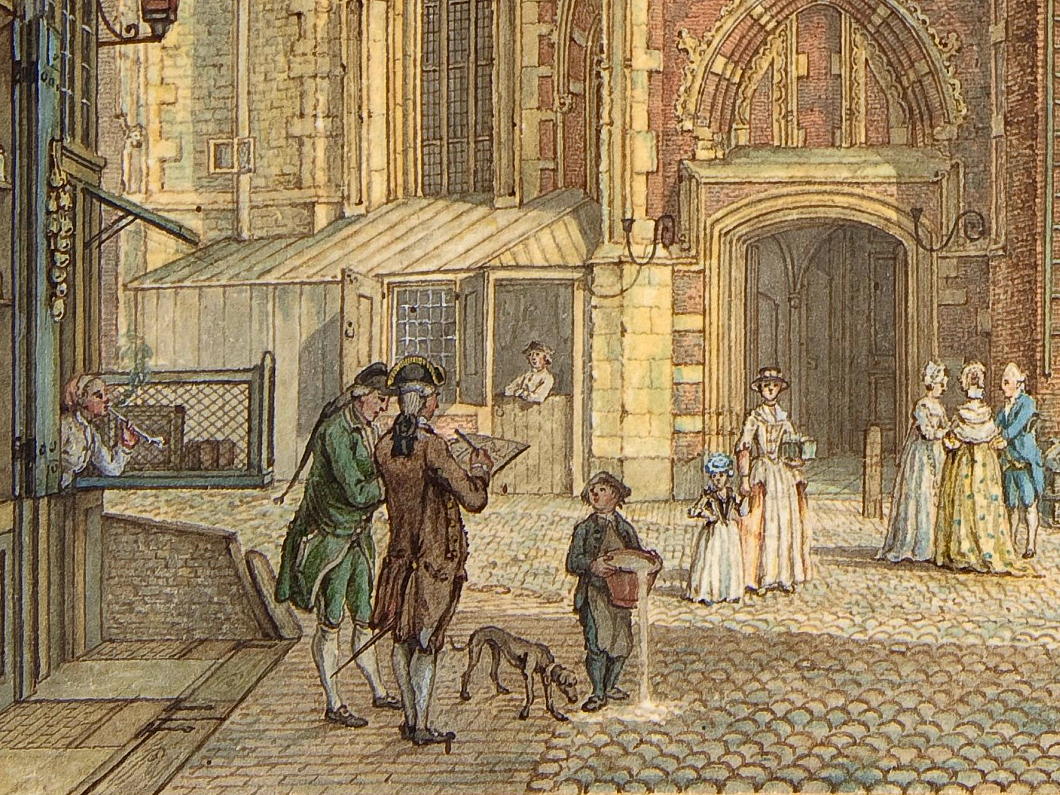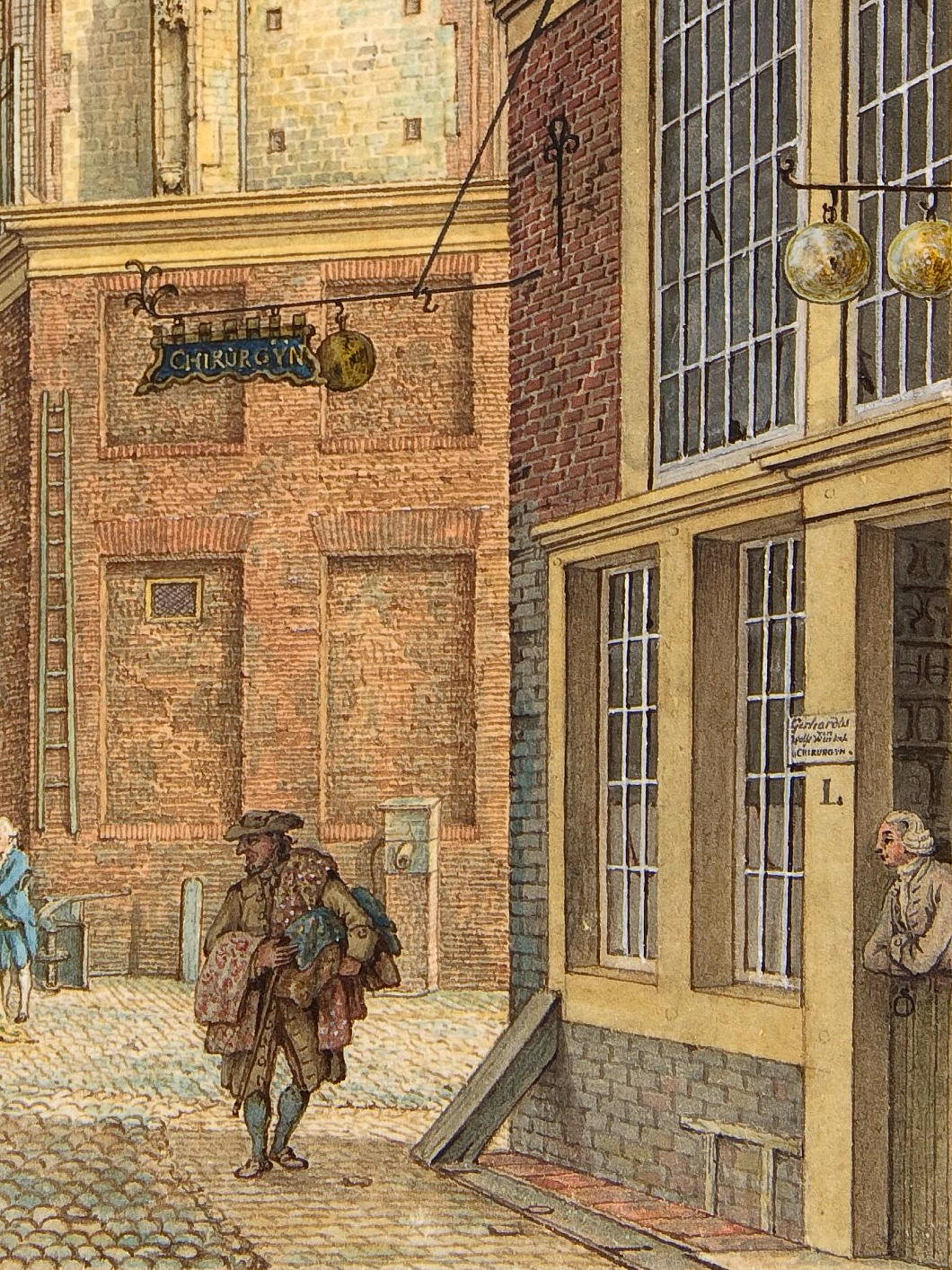
About Andrew Cusack
 Writer, web designer, etc.; born in New York; educated in Argentina, Scotland, and South Africa; now based in London.
Writer, web designer, etc.; born in New York; educated in Argentina, Scotland, and South Africa; now based in London. read more
News
Blogs
Reviews & Periodicals
Arts & Design
World
France
Mitteleuropa
Knickerbockers
Argentina
The Levant
Africa
Cape of Good Hope
Netherlands
Scandinavia
Québec
India
Muscovy
Germany
Academica
Sag Harbor Cinema
For a film fan, to grow up in an American town with a small cinema is to win the lottery of life.
In my childhood, we had the advantage of two little movie houses within walking distance: the three-screen Bronxville Cinema and just a little bit further afield by foot the single-screen Pelham Picture House.
Fittingly, these two are now run together as the somewhat pretentiously titled but no-doubt quite useful ‘Picture House Regional Film Center’.
Way out on the South Fork of Long Island, the old whaling village of Sag Harbor has the perfect little small-town American movie theatre.
There is something just right about this cinema on the village’s Main Street — as Variety put it: “beloved for not only its obscure programming but also its 1930s red neon sign with the village name”.
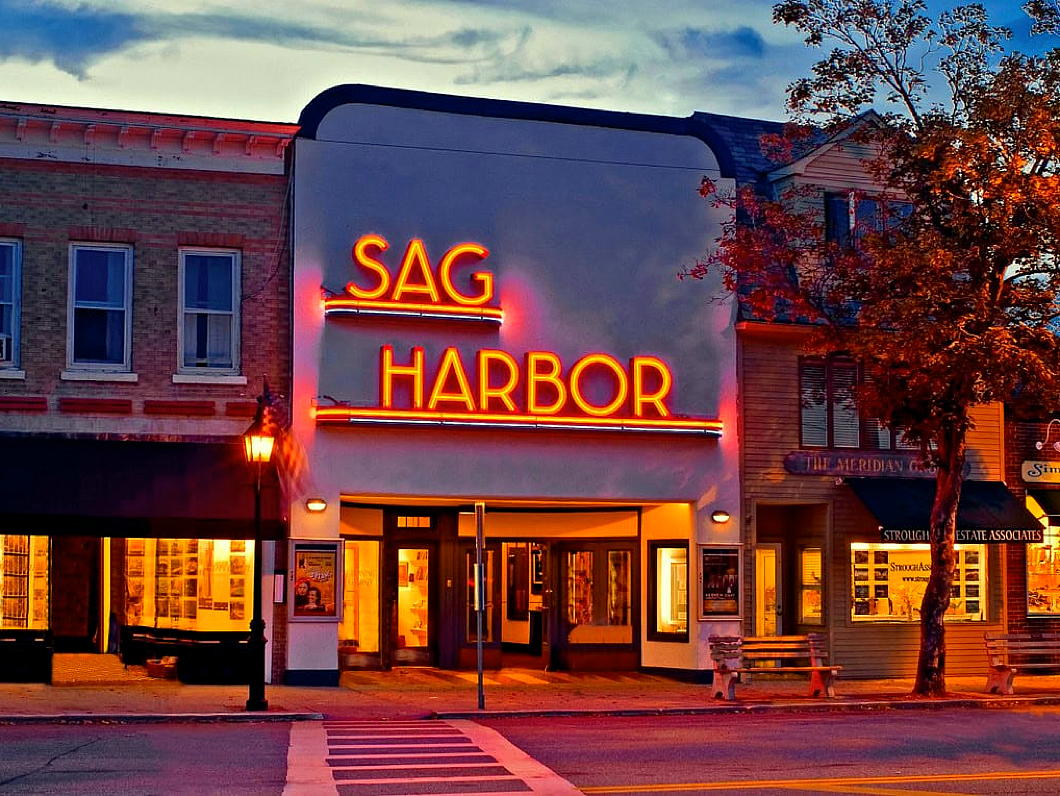
The single-screen cinema first graced the main drag of the village in 1936, the creation of architect John Eberson whose ‘atmospheric’ movie theatres are dotted across the United States and even as far as Australia.
Eberson designed two of greater New York’s five Loews ‘Wonder Theatres’: the Loew’s Paradise on the Grand Concourse in the Bronx neighbourhood of Fordham and the Loew’s Valencia in Jamaica, Queens.
This cinema was purchased by Gerard Mallow in 1978 who for nearly four decades preserved the Sag Harbor Cinema as an arthouse movie theatre with an eclectic offering.
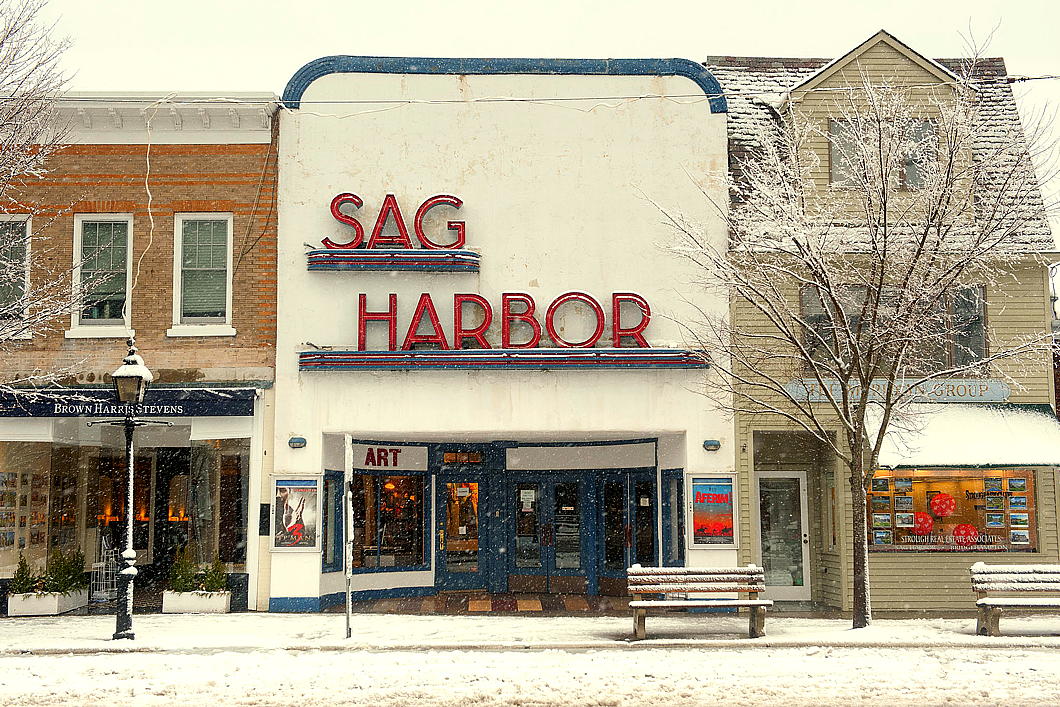
In December 2016, the cinema suffered a devastating early morning fire that destroyed most of the structure.
The iconic neon signage was salvaged by Chris Denon of North Fork Moving and Storage and the sculptor and ironworker John Battle.
Meanwhile, a community partnership that was already in discussions to purchase the institution from Mr Mallow came together to raise funds and oversee the rebuilding, including several improvements.

The main hall was divided between a large screening hall and a smaller one, along with a new screening room on the first floor (that’s second in American English) behind the iconic façade.

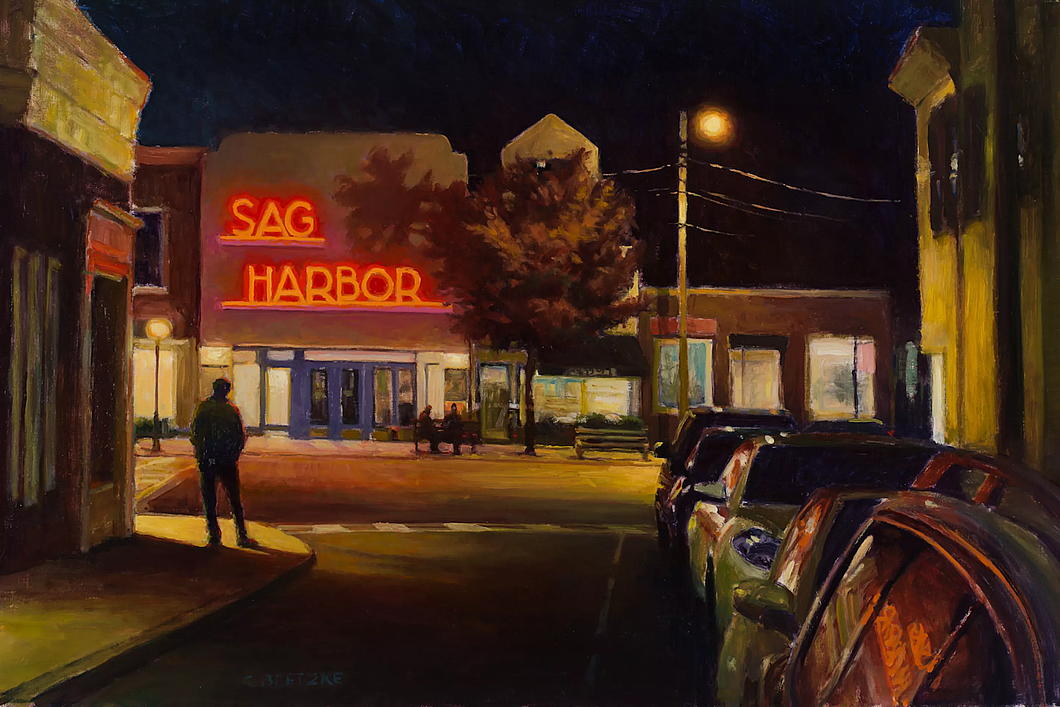
The artist Carl Bretzke captured Sag Harbor’s cinema in plein-air painted form.
Encouraged by the Grenning Gallery, Bretzke offered limited-edition prints of his painting, the proceeds of which helped to pay for reconstructing the movie theatre.



NK Architects also created a new bar and lounge, two roof terraces, an art gallery, and educational space within the original footprint of the cinema.
Following coronavirus-related delays, the new facility finally re-opened in June 2021.




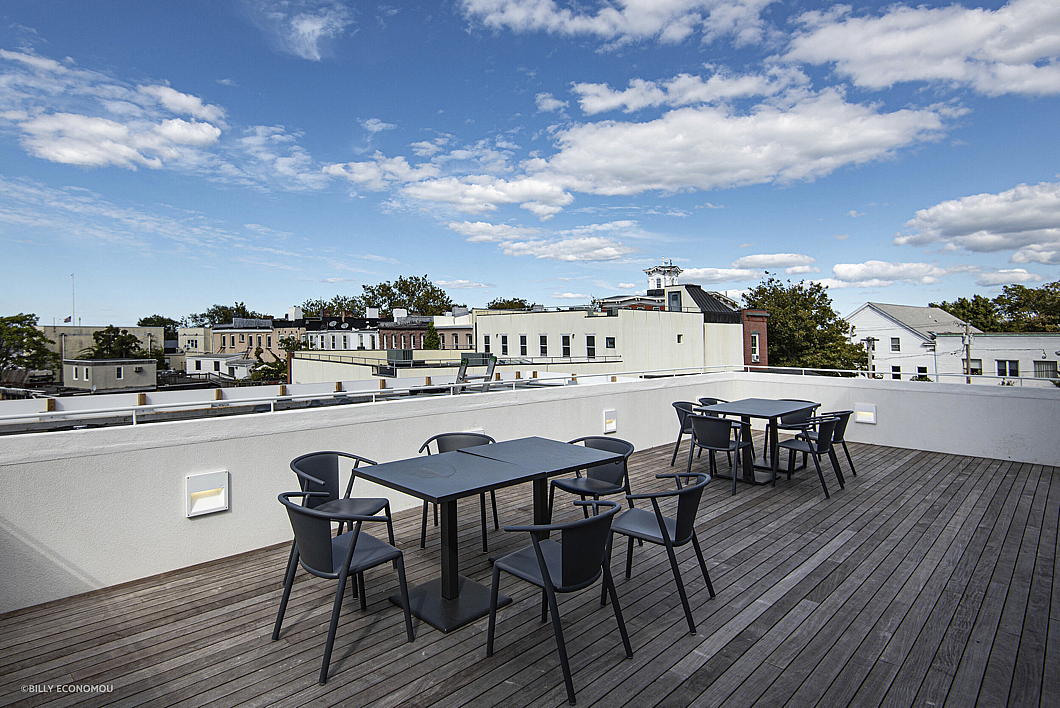
Given the improvement in the facilities, it seems like the Sag Harbor Cinema’s fire was the best thing to ever happen to it.
It is reassuring to know this little movie theatre will be gracing Sag Harbor’s Main Street for many moons to come.
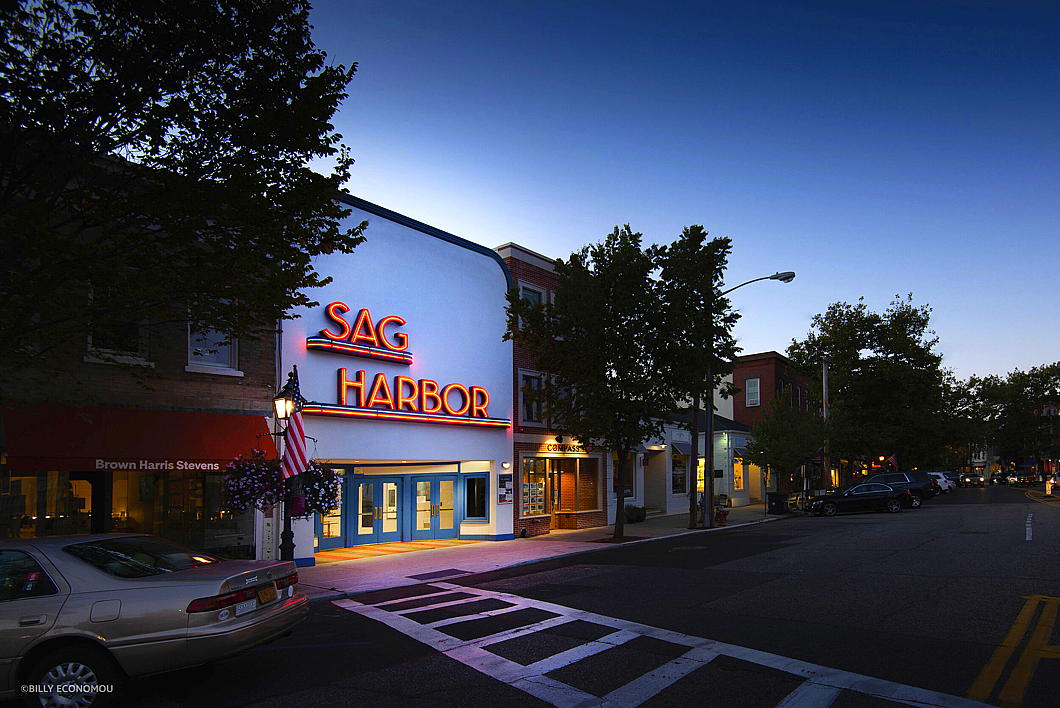
Teutonic Takeover
What is going on in Chile? They’re having a presidential election later this year, and the latest poll figures are out.
The top three candidates are all right-wingers descended from German immigrants, but with very different family backgrounds.
How their ancestors ended up in the Andean republic on the Pacific reflects the varieties of experience in the German diaspora in South America.
■ Read more over at my Substack.
Katalin Bánffy-Jelen, R.I.P.
I have the poet Ben Downing to thank for putting me on to the great Hungarian writer Miklos Banffy. I will always be grateful.
But the one to whom I should be even more grateful is the writer’s daughter Katalin Bánffy-Jelen who died last month, 100 years old.
She, along with Patrick Thursfield (d. 2003), translated the great Transylvanian trilogy from Hungarian into English.
There were obituaries in The Times and the Daily Telegraph.
After the war, Katalin married a US naval officer and they settled in Tangier, still then a free port under a sort of multinational administration.
I wonder if she would have known Fra’ Freddy’s father when he was British delegate to the International Legislative Assembly of Tangier.
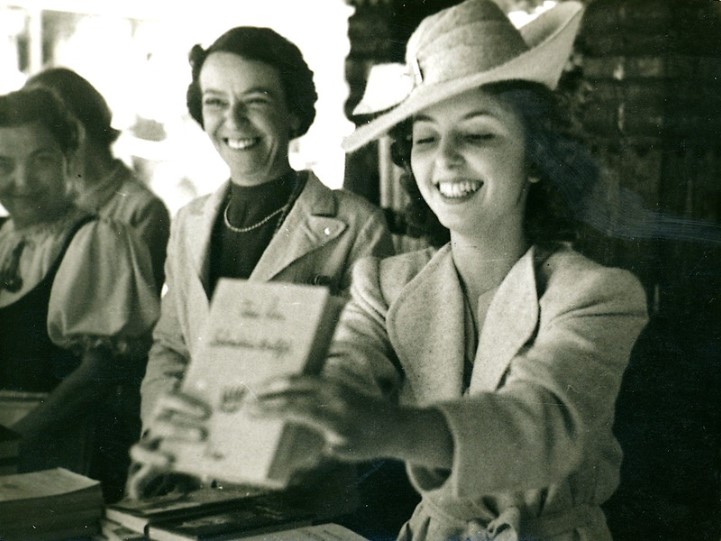

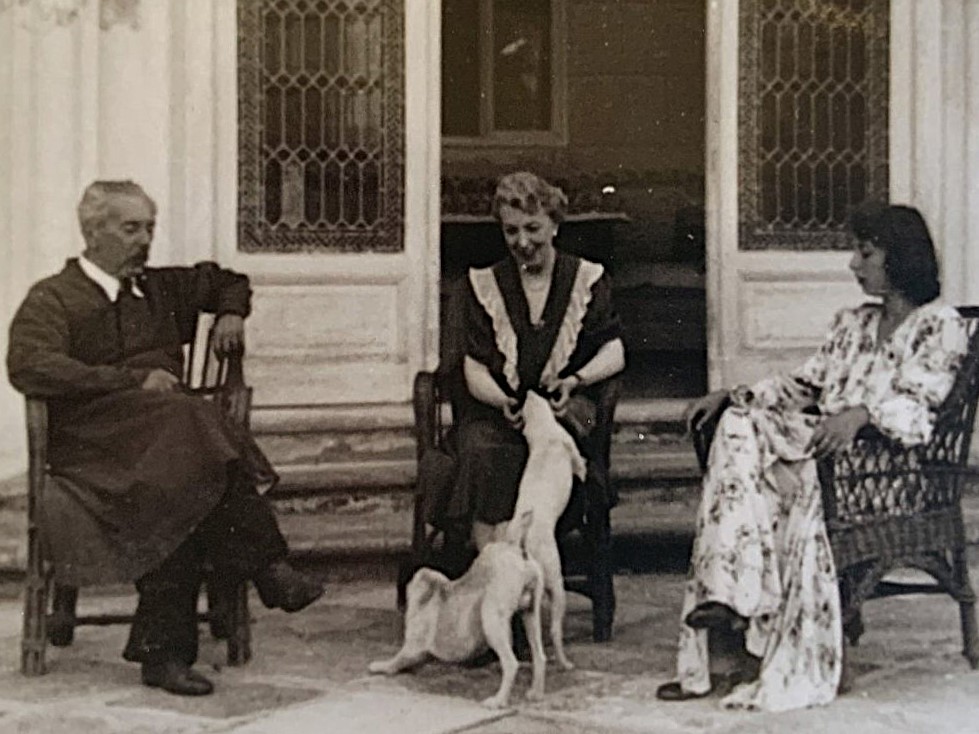
Substack Cusackiensis
For my sins, I have started a little “substack”, despite my objections to the entire medium. If you are the sort of person who is on Substack, you can find it here.
It is important to claim the territory to prevent any of the other Andrew Cusacks out there from nabbing it. A pre-emptive “substack”.
Theoretically it could inspire one to write more, though these days I prefer to write for people who pay me to.
In the Courts of the Lord

Well, not quite a lord, but a Vanderbilt — which in America is much the same. The indoor tennis courts at “Idle Hour” in Oakdale, L.I., were some of the grandest ever built in the United States.
The house itself, designed by Richard Howland Hunt for William Kissam Vanderbilt and completed in 1901, is unremarkable and not on the finer end of the spectrum. To me, it has all the glamour of a railway station serving a mid-sized town.
Just a year later, however, W.K. commissioned the architectural partnership of Warren & Wetmore — later famous for Grand Central Terminal — to design an extension that featured an indoor tennis court with adjacent guest quarters in a somewhat extravagant style.
As the polymathic Peter Pennoyer pithily put it in his The Architecture of Warren and Wetmore:
“The heavily rusticated stone of the gallery wall, exuberantly carved with atlantes and fanciful over-door sculpture and painted with scrolling frescoes, created a sculptural backdrop so surprising and original that it overwhelmed the vast open space of the court. For an ancillary building, the scale and energy of the architecture were tremendous.”
One can certainly imagine enjoying a refreshing summery gin-and-tonic on that loggia.
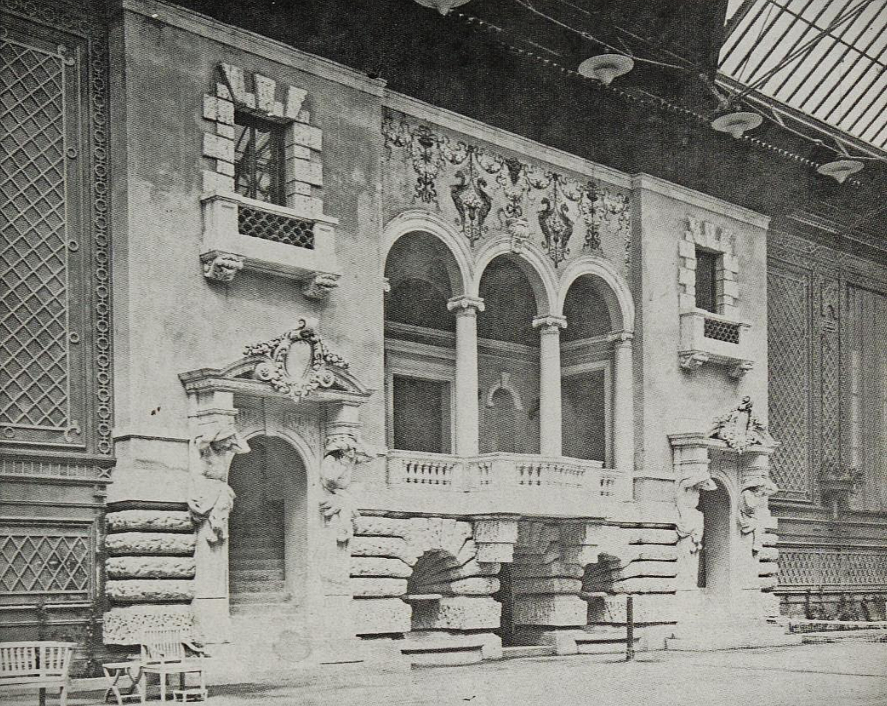
William Kissam Vanderbilt died in 1920. After a spell as an artists’ colony, in 1938 the estate was purchased by a cult called the Royal Fraternity of Master Metaphysicians, founded by a rogue named James Bernard Schafer who claimed he could raise an immortal child. (They also bought the old Gould stable on West 57th Street.) Schafer was jailed in 1942.
The National Dairy Research Laboratory took over the property and split the former tennis courts into lab space. Long Island’s Adelphi College bought Idle Hour in 1963 as an overflow campus which they later spun off into an independent institution, Dowling College, which shut in 2016.
For another indoor tennis court from the same period, see the old Astor place in Rhinebeck in the Hudson Valley.
American Exuberant

I have seen far too little of California, which is a shame because the confident freehand of American architecture between the wars reaches its greatest exuberance in the Golden State.
William Gayton began his eponymous Gaytonia Apartments in Long Beach, Ca., in 1929 and they were only midway complete before, as the characteristically colloquial style of Variety put it, Wall Street ‘laid an egg’ with the stock market crash.
This is a deliciously free California Gothic, unbothered by the pretensions of historicist verisimilitude. (A contrast to our still-much-appreciated academic friends on the East Coast.) Indeed, despite its castellar appearance it is mostly constructed of artfully handled stucco on wood disguising itself as stone.
And, true to the apartment house form, there’s even underground parking.

Crux Alba Journal Launch
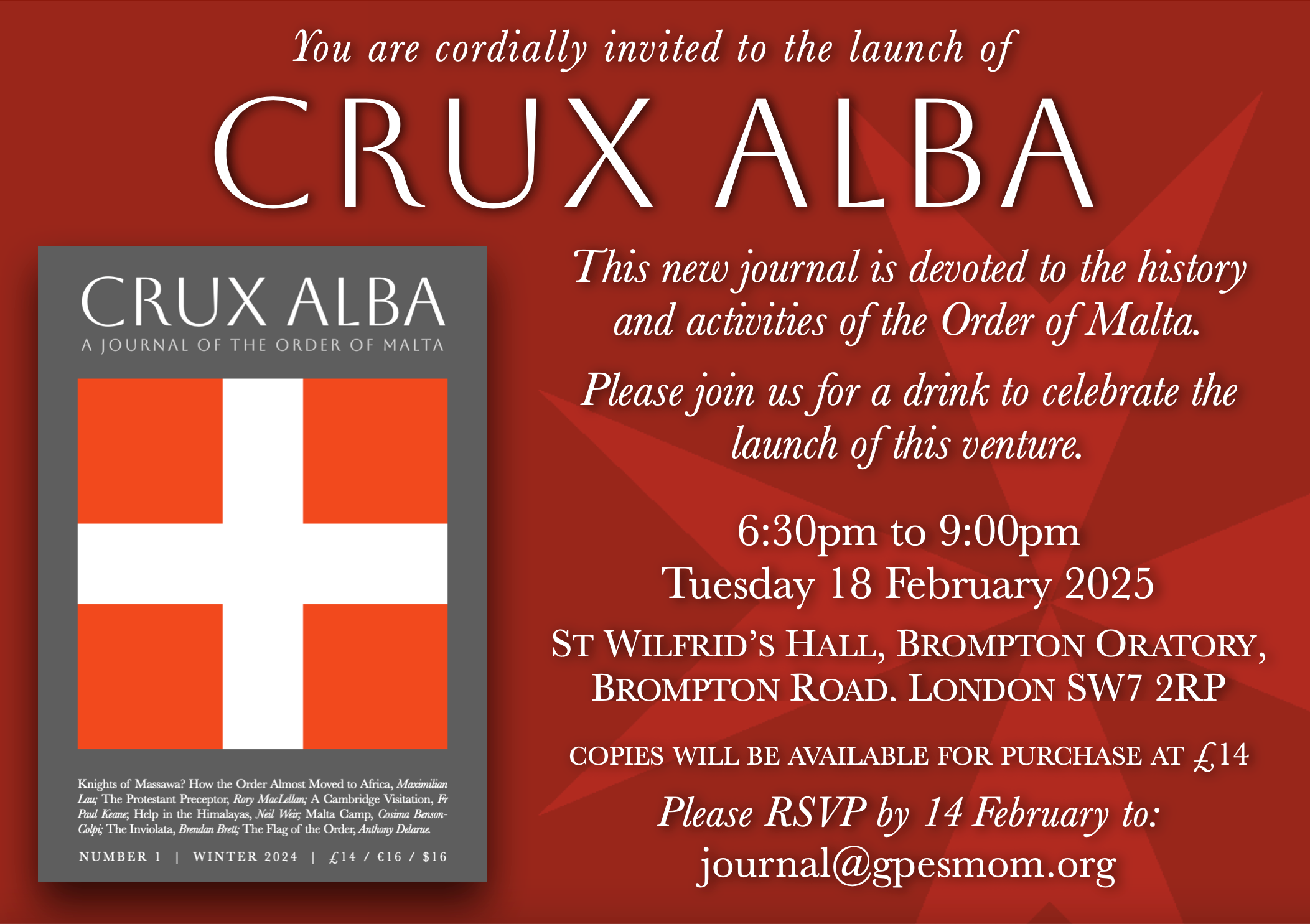
You are cordially invited to the launch of
This new journal is devoted to
the history and activities of the Order of Malta.
Please join us for a drink to celebrate the launch of this venture.
6:30pm to 9:00pm
Tuesday 18 February 2025
St Wilfrid’s Hall, Brompton Oratory, Brompton Road, London SW7 2RP
Copies will be available for purchase at £14
Please RSVP by 14 February to:
journal@gpesmom.org
Please share this invitation with others who might be interested in attending.
See also the Crux Alba website, Instagram, and Twitter.
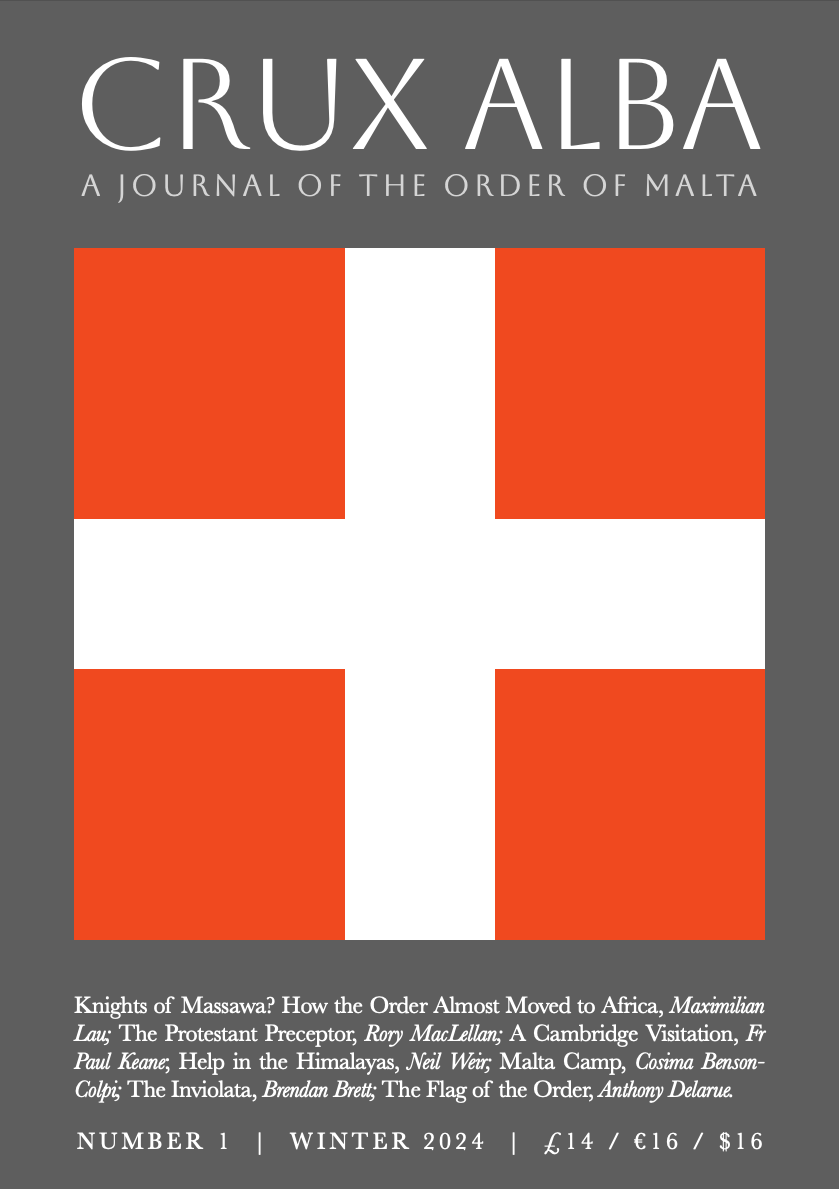
The Year in Film: 2024
I love a trip to the cinema and since 2021 we’ve had an Everyman cinema here in God’s Own Borough of Southwark, smack dab in the heart of Borough Market — a great boon for us locals.
We already have the BFI (and its IMAX) next door on the South Bank, but the comfort and quality of an Everyman is well worth the price of the ticket. (Sadly, this website is not yet sponsored by the Everyman corporation, but we are open to such possibilities.)
I thought a brief overview of most-but-not-all the films I managed to see on the big screen in anno domini 2024 was worthwhile, so here goes:

The Boys in the Boat (USA, 124 min) — Who can say no to a good old-fashioned American feel-good film? And a rowing film, at that. Excellent recreation of the 1930s and a nice beat-the-Nazis true story. (Caveat: In a brief moment, they got the name of Jesse Owens’ university wrong.)

The Holdovers (USA, 133 min) — It’s been a while since we had a decent New England boarding school film. A pupil neglected by his parents is forced to stay at school over the Christmas holiday, with an equally forced teacher resenting his presence.
Teenager Dominic Sessa is excellent in his first film role — he was allowed to audition as they were filming at his school, Deerfield — but the real star is Da’Vine Joy Randolph as the school cook.

Interstellar (USA, 169 min) — This 2014 film from director Christopher Nolan is vast in its vision. BIG. An intriguing reflection on the love of a family and the fallen nature of even the bravest individuals that revives the neglected genre of cosmic dread. Ideal for IMAX which it was re-released on for its tenth anniversary. Nolan doesn’t disappoint.
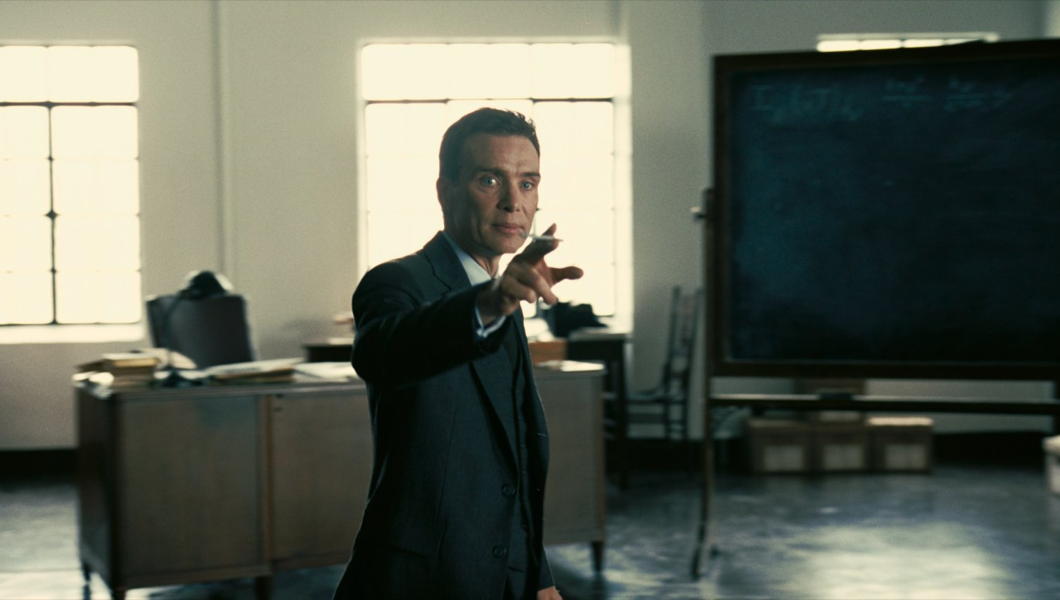
Oppenheimer (USA, 180 min) — Nor did Nolan disappoint here. This film didn’t feel nearly as long as it was, but it was beautifully captivating. I was surprised that my filmgoing companion, who has the attention span of a small child, was seeing it for her second time; I was even tempted to give it a second viewing myself (but didn’t). Top-notch film score from Ludwig Göransson, as well. ‘Oppenheimer’ was serious without being tiresome.

The Fall Guy (USA, 126 min) — A stunt double in love with his beautiful colleague is unwittingly embroiled in a conspiracy to cover up an accidental death on the set of her directorial debut.
The light-hearted framework of an incredibly charming romance nonetheless has some cracking action scenes. Anyone who’s ever been in love should enjoy this film. Emily Blunt was brilliant but Hannah Waddingham is the surprise of the show.
This one I did see twice in the cinema — a first since the film-of-the-decade ‘Top Gun: Maverick’. We need more films as delightful as this.

Fly Me to the Moon (USA, 132 min) — An advertising executive (Scarlett Johansson) and the NASA launch director (Channing Tatum) are forced fake the moon landings — just in case — by shadowy forces of the state (Woody Harrelson). Silly and fun.
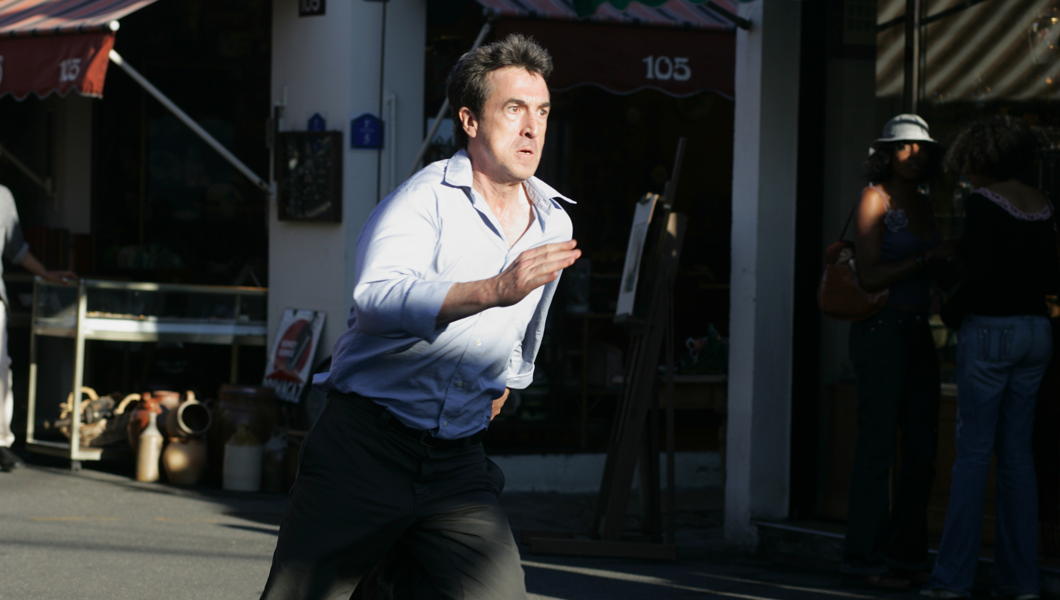
Ne le dis à personne / Tell No One (France, 131 min) — This might be my favourite film and I probably watch it every year or so. A doctor whose wife was murdered eight years previous may finally be implicated in her murder — until a cryptic email arrives in his inbox suggesting she might still be alive. He must move heaven and earth to evade the police, find his wife, and prove his innocence.
Released in 2006, ‘Ne le dis à personne’ is the perfect blend of thriller, action, intrigue, romance, and it has Kristin Scott Thomas. What more could you want? It gratuitously adds to that with performances from François Cluzet, the amazing Jean Rochefort (RIP), Nathalie Baye, and André Dussollier.
While based on a book by Harlan Coben, the director Guillaume Canet changed the ending: the writer said the director’s conclusion was better than his. Not a perfect film — there were one or two things I would have done slightly differently — but an expertly crafted one all the same.

The Count of Monte Cristo (France, 178 min) — I’ve read the book three times and each experience has hit differently. This adaptation was watchable but flawed. The main actor lacked gravitas and it’s a tad overproduced.
The 1998 Depardieu miniseries remains the standard. Apparently we’re getting an Italian-French co-produced miniseries sometime this year but it looks disappointing, too.
Might be time to read the book again.

Ghostbusters (USA, 105 min) — What a delight this film is. Impossibly silly, deeply enjoyable, and — from the opening scenes at Columbia University and the New York Public Library — one of the most New Yorker films ever. (“Ghostbusters, whaddya want.”) It even features a cardinalatial nod of approval.
A film like this is always best in the cinema. I think ‘Ghostbusters’ may have been the first movie I ever saw in a cinema: in the movie theatre in Edgartown on Martha’s Vineyard when I was a very small boy but it was already on revival. Glad to see it again on the big screen in London.

Juror No. 2 (USA, 114 min) — Clint Eastwood is well into his 90s and still knocking it outta the park with a well-crafted film like this.
A moral thriller in which a recovering alcoholic with a newborn is called for jury duty in a murder trial and slowly begins to think he may be the one responsible for the victim’s death.
There’s a lot of layers in this film but never too much to handle. This one will get you thinking.

Point Break (USA, 122 min) — Big California vibe! Surfing, skydiving, bank-robbing, and the Feds. Kathryn Bigelow’s 1991 film became a minor cult classic and made $83.5 million on a $24 million budget. Enjoyed it.

Gladiator II (USA/UK, 148 min) — I went in with drastically low expectations but left the cinema pleasantly surprised.
Main actor Paul Mescal was a bit of a dud — tá brón orm, a chara! — but Denzel Washington stole the screen whenever he was on it. Reprises from Derek Jacobi and Connie Nielsen were strangely heartwarming, like the return of old friends.
The Twin Emperors were DEEPLY creepy and Pedro Pascal’s acting matures like a fine wine. There was even a role for our old Mossad friend Lior Raz (of ‘Fauda’) and Tim McInnerny (‘Blackadder’, etc.) played a hapless senator.
Far from the classic status its predecessor enjoys, but enjoyable all the same.
Articles of Note: 27 January 2025

Recently we welcomed the Latin Patriarch of Jerusalem, Cardinal Pizzaballa, to London on a visit of several days. He has what must be one of the most difficult jobs in the world, caring for Latin-rite Christians and their neighbours in Israel, Palestine, Jordan, Cyprus, and I think possibly the Sinai as well.
We first met in Jerusalem in 2023, so catching up with him for a second (and then third!) time to hear about the situation in the Holy Land was illuminating, if a bit depressing.
At First Things, Cole Aronson meets the Patriarch and explores his unique and demanding role.
■ The Pantheon in Paris, where secular heroes are entombed either physically or symbolically, presents one of the most intriguing aspects of France’s civil religion.
On the eightieth anniversary of the liberation of Strasbourg, President Macron announced that the academic, army officer, and father of the Annales school of historians Marc Bloch would be elevated to the Pantheon.
In the American Conservative, Luke Nicastro explores France’s newest hero.
■ Along with Frankfurt and Potsdam, Budapest has undergone one of the most comprehensive programmes of urban repair in recent years.
The Financial Times’s architecture critic Edwin Heathcote reports informatively, despite his simplistic conceptual error of slagging off rebuilding as reaction.
I’ll say it again: it’s not turning the clock back — it’s choosing a better future.
■ Candlemas is fast approaching but there’s still a few days left before the Christmas season ends properly.
The old-school Irish Protestant ‘Laudable Practice’ provides an excellent critique of a First Things piece: Old High Christmas Cheer, or Why the Oxford Movement Did Not Save Christmas.
Much good came from the Oxford Movement, but there is a tendency today to underestimate the levels and layers of cultural continuity in England across the centuries.
Laudable gets this right, pointing to how the Georgians celebrated Christmas. Nicholas Orme has written on how the feast of the Incarnation was kept in mediaeval England.
■ Finally, Lord Sumption peeks into the world of espionage in the Middle Ages.
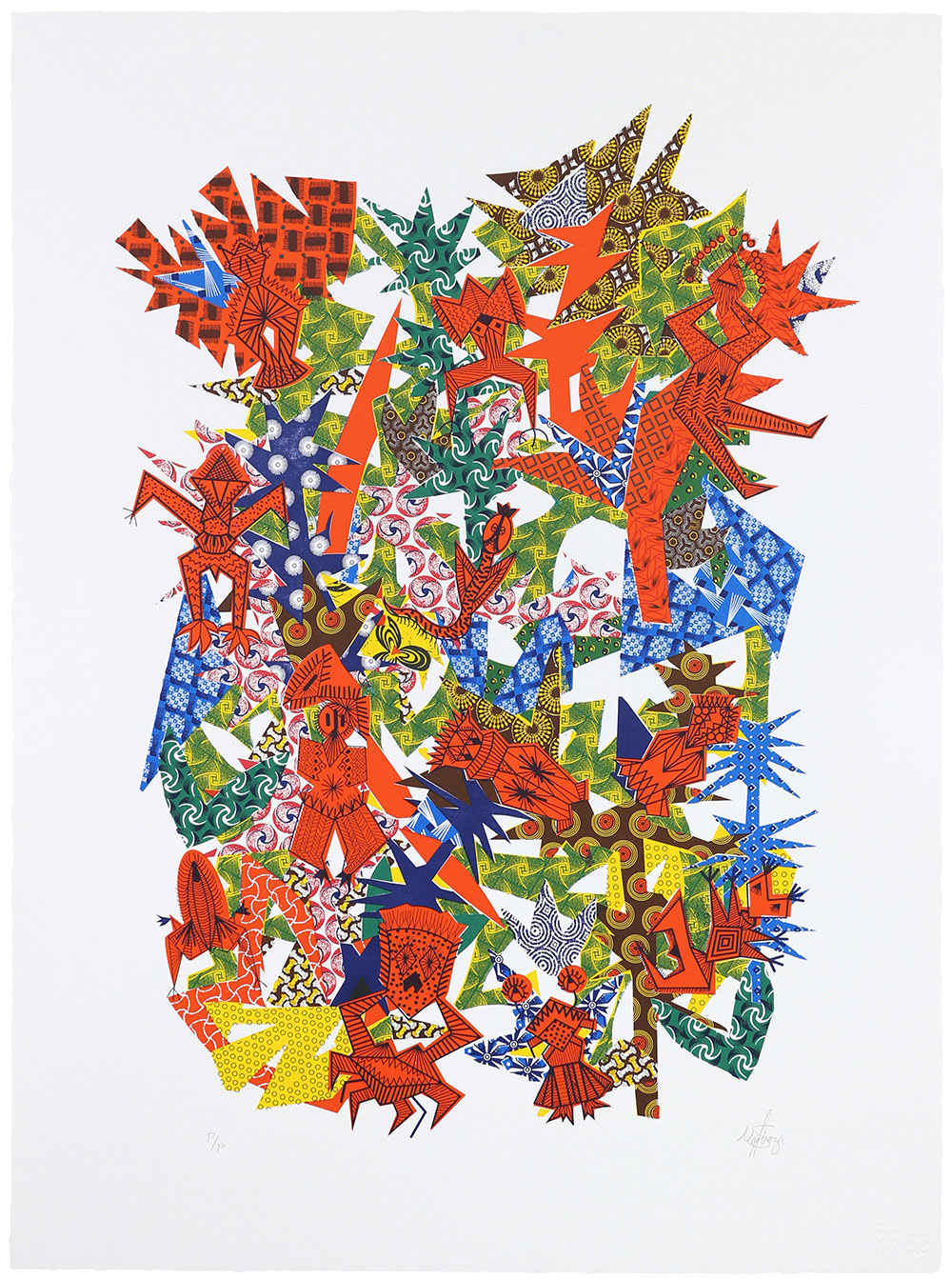
Spooks’ Crown
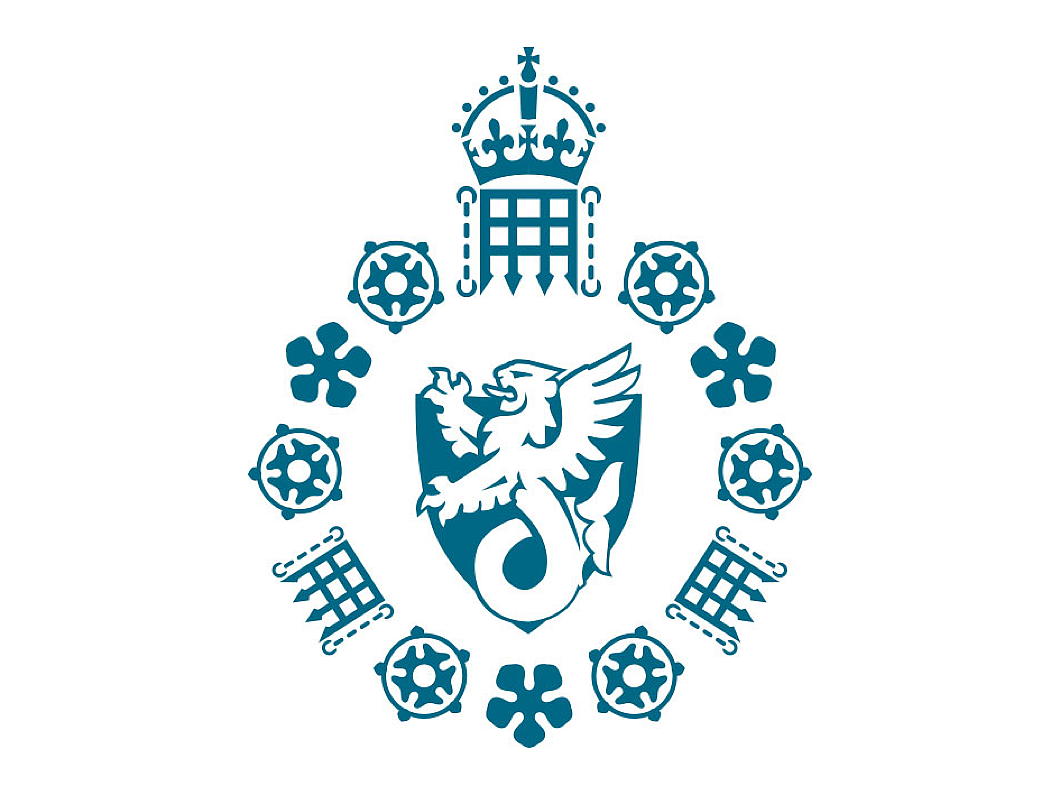
The Security Service, better known as “MI5” has changed its badge to incorporate the change from the St Edward’s Crown to the Tudor Crown that King Charles III has adopted.
The badge was designed by Lt-Col Rodney Dennys who himself had worked for the Security Service’s more glamorous rival, the Secret Intelligence Service (MI6). Dennys had started out in the intelligence game at the Foreign Office and was posted to the Hague before the war. When the Germans rolled in he was on one of the last boats to make it to Britain.
The MI5 emblem was approved by Garter King of Arms in 1981 but (like MI6) the Security Service was still so secret that it did not officially exist, so it was added to the secret roll of arms kept under lock and key in the depth of the heralds’ college in the City of London.
In 1993, after the Service’s existence was formally acknowledged, the badge became known and a flag bearing it often flies from the top of Thames House.

GCHQ has likewise adopted the Tudor Crown, but SIS has not publicly acknowledged any official emblem. (Perhaps it has its own entry in the heralds’ secret roll?) As such, MI6 uses a government version of the royal coat of arms, but theirs has yet to swap crowns.

Jesuit Gothic
The Duane Library at New York’s Fordham University
Think of Jesuits and architecture and you probably think of the Baroque. At Fordham University, however, the SJs followed the American fashion and built in the Collegiate Gothic that gradually took hold of campuses across the continent from the middle of the nineteenth century onwards.
The first academic buildings in Anglo-America — like Harvard’s Massachusetts Hall and Yale’s Connecticut Hall — were in the vernacular Georgian style of the colonies. Robert Mills’ 1839 design for a library building at West Point was one of the first Collegiate Gothic buildings in America (and that institution’s first step on the road to going full Gothic). Some partisans will hold out for Old Kenyon as the first, others for Knox College’s Old Main. These, however, are survivors: the first Gothic university building in America was NYU’s University Hall on Washington Square, foolishly demolished in 1894.
Gothic is not solely an architectural style and it was a West Pointer, Edgar Allan Poe, who first crafted and popularised a distinctly American Gothic bailiwick in the republic of letters.
As Prof John Milbank put it the other day:
“[The] American gothic literary tradition contests the mainline American story. For the gothic perspective, the United States is a very old country: there since 1600, bearing medieval freight. Its exploring of frontiers will not open up hope, but encounter hidden horrors and horrifying potentials.”
“Far from having escaped Old Europe and started afresh and innocent, for the Gothic tradition it is rather that all the more extreme European demons (sects, cults, fears, fantasies) have fled to the New World where they always lurk, in league with its uncannily vast spaces.”
The architectural cornerstone of this Gothic chain of being linking both side of the Atlantic is St Luke’s Church in Newport, Virginia, built in the 1680s. Its pointed arches have sparked great bones of contention amongst architectural historians: is this an organic expression of a still-existing tradition from the Old World or a contrived and purposeful orchestration by colonial settlers? Gothic survival? Or Gothic revival?
I plump for the former: Gothic has always been a living tradition, even if somewhat neglected in certain generations. Ideology and architecture don’t mix well, whether it’s Pugin purporting that anything that is not Gothic is effectively pagan, or partisan modernists deriding any contemporary use of traditional forms as “pastiche”. The term “revival” is useful chronologically, but can obfuscate the breadth of an architectural, artistic, or literary style.
The brickwork tracery of Newport church renders the Gothic style in all its glories and shapes and forms an eternally valid option for the architecture of the New World. You can bauhaus all you want to, but American Gothic is real.
Thus whether unleashing ancient demons or — in the Jesuits’ case — slaying them, college presidents across the United States enthusiastically adopted the Collegiate Gothic style (while at the same time omnivorously crafting feasts of neo-classical, colonial, beaux-arts, and other styles).
Interwar American Gothic is some of the best Gothic of the twentieth century, and probably won’t be matched for centuries yet. Aside from excellent academic examples, just look at when the Gothic merges with the Art Deco as in the old GE Building by Cross & Cross at 570 Lexington Avenue.
Founded by the Jesuits in 1841, St John’s College found a home in the old manor of Fordham in the Bronx, granted to the Dutchman Jan Arcer (anglicised at John Archer) in 1671 by the provincial governor Francis Lovelace — brother to the poet Richard. Bishop John Hughes purchased the 106-acre Rose Hill estate to found a college and diocesan seminary. Eventually St John’s College took up the name of Fordham University by which it is known today.
Our old friend Edgar Allan Poe lived in a cottage in Fordham quite close by the college. He found his friends and neighbours the Jesuits “highly cultivated gentlemen and scholars, they smoked and they drank and they played cards, and they never said a word about religion”. It is claimed by some that the bell of ‘Old St John’s’, the Fordham University Church, helped inspire his famous poem ‘The Bells’.
The university grew slowly until the 1920s, a decade of expansion during which president Fr William J. Duane SJ was keen to build a suitable library for the college. The library that would one day bear his name was built 1926-1928 to a design by the Philadelphia architect Emile George Perrot, accomplished in his day but not now widely remembered. (Incidentally, Perrot later completed a building — White-Gravenor Hall — at America’s first Catholic and elder Jesuit university, Georgetown.)
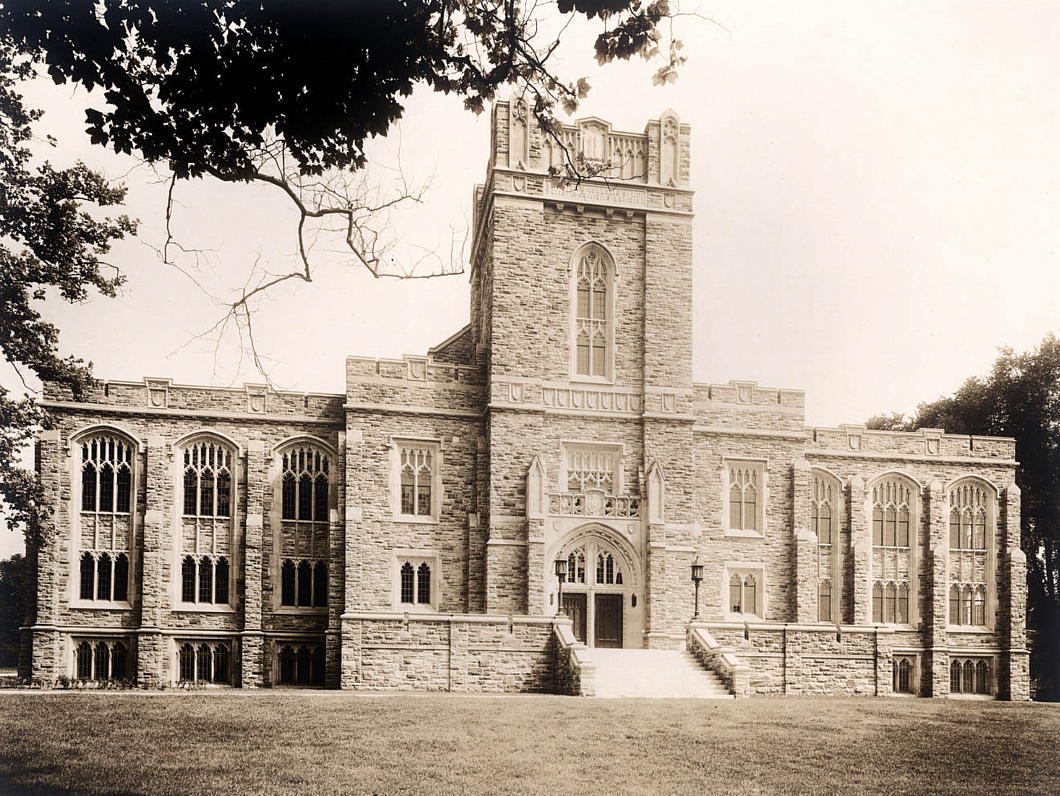
“Architecture,” Perrot wrote, “is the incarnation in stone of the thought and life of the civilization it represents.” If Duane Library is anything to go by, the thought and life were fine indeed.
Perrot provided a central block crowned with a tower, flanked by two pavilions. In front, a wide flight of steps ascends to a raised platform and, through a pointed arch, the reader is led via the entry portal up a further set of internal stairs to the principal floor of the library.
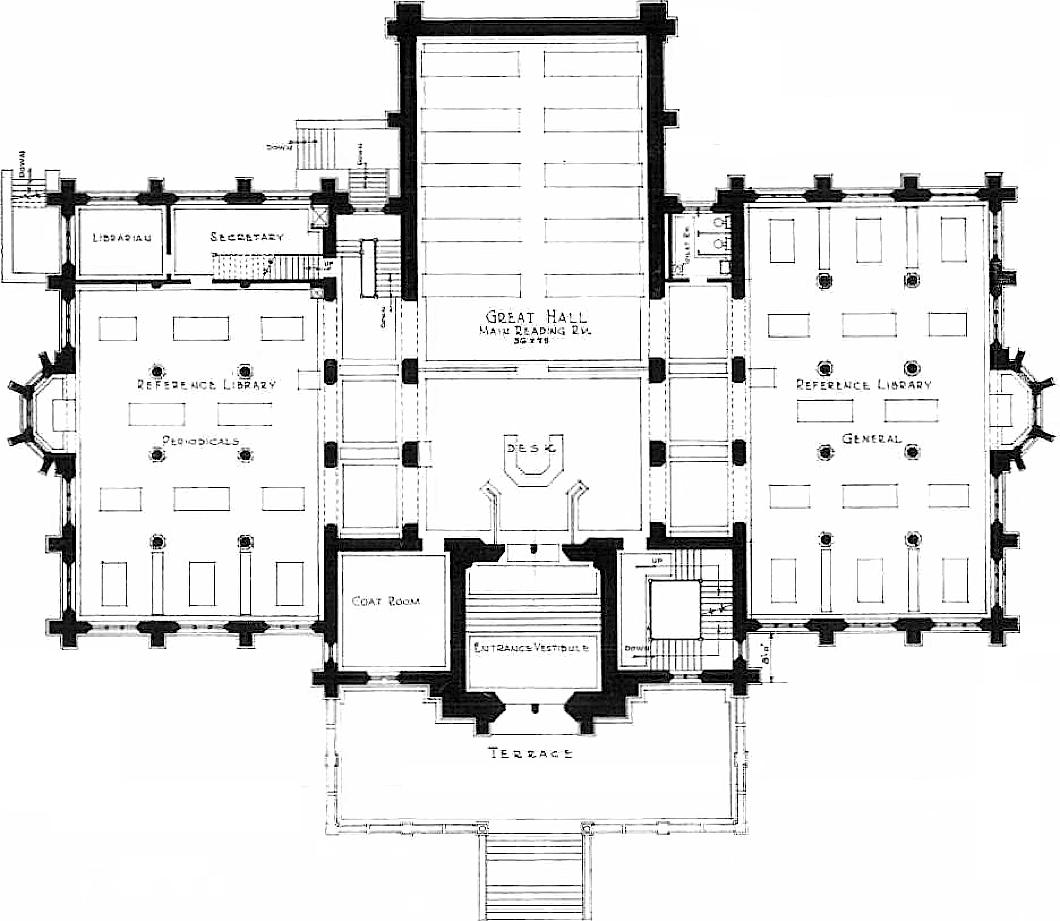
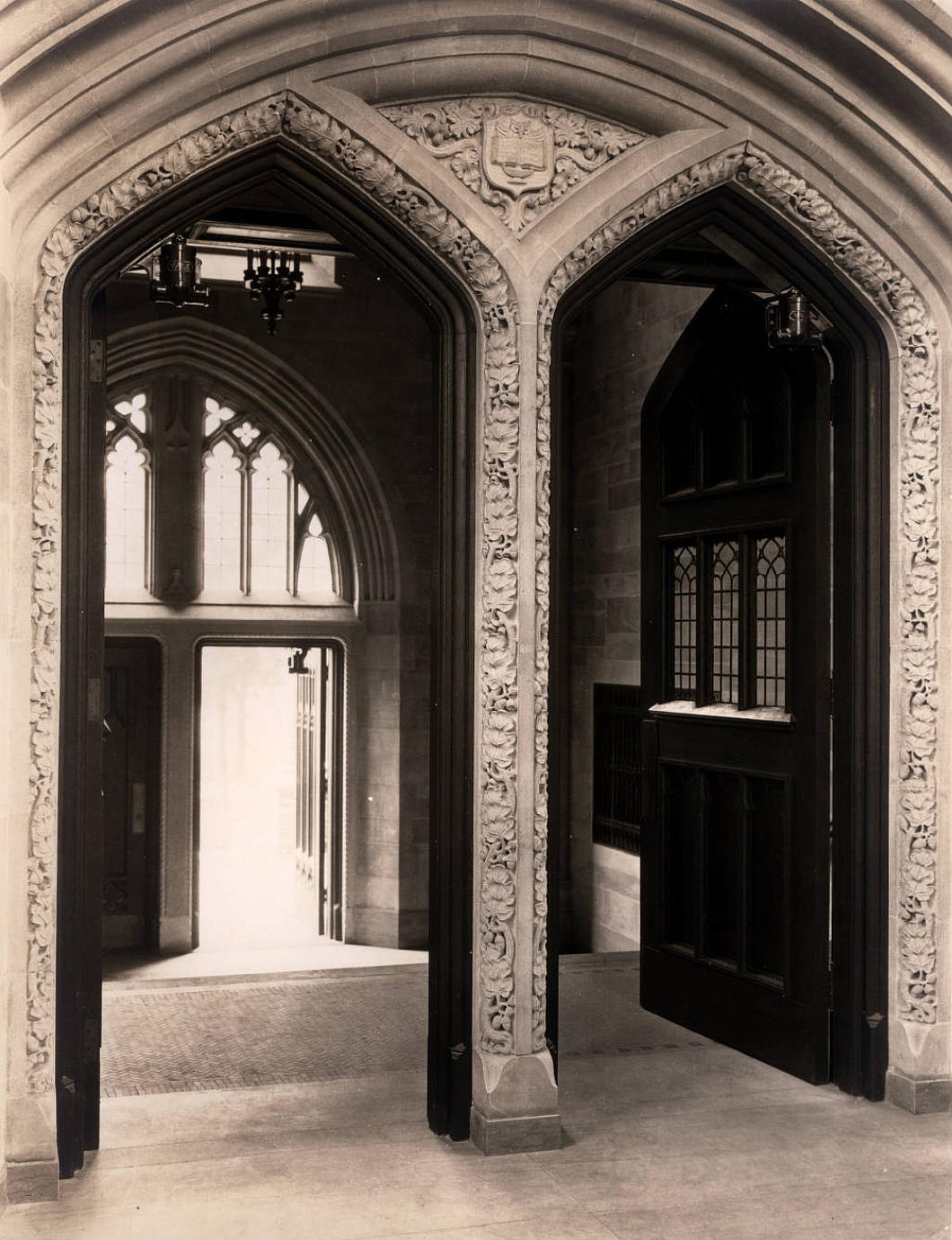
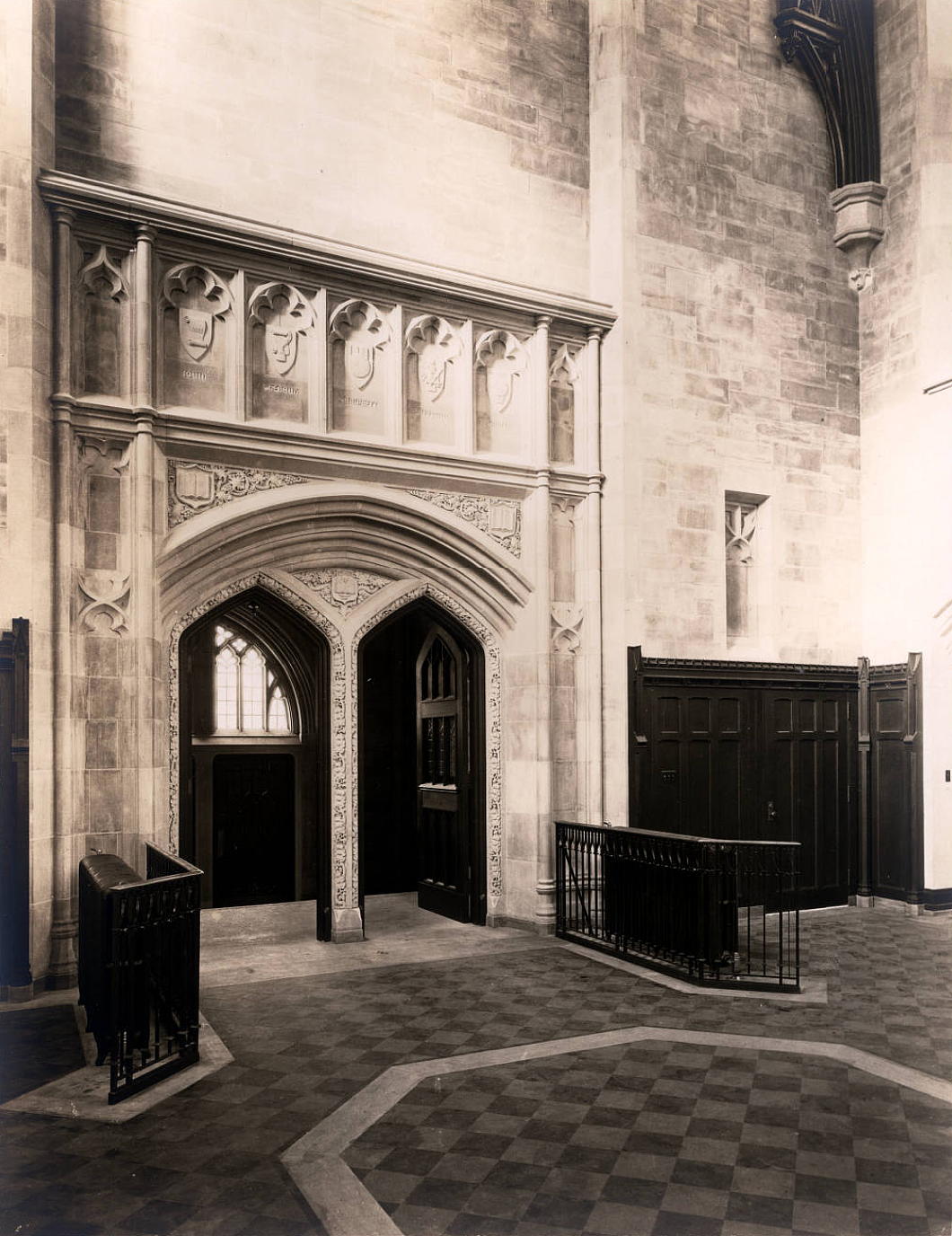
Through these doors with their intricately carved surrounds, the reader enters the great hall of the library, passing a circulation desk — housing no-doubt assiduous and eagle-eyed librarians preserving order and quiet — and onward through a carved wooden screen to the reading area beyond.
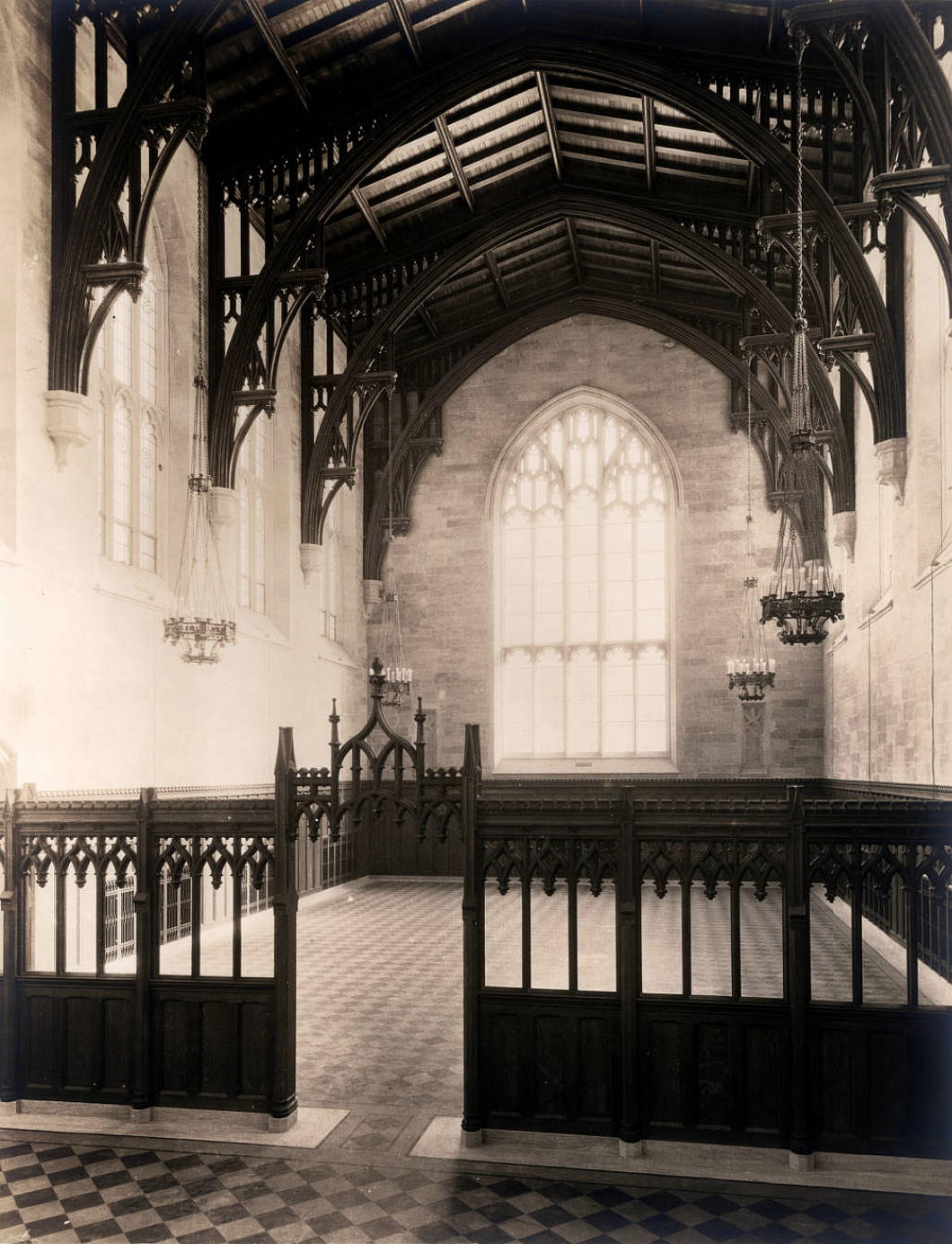
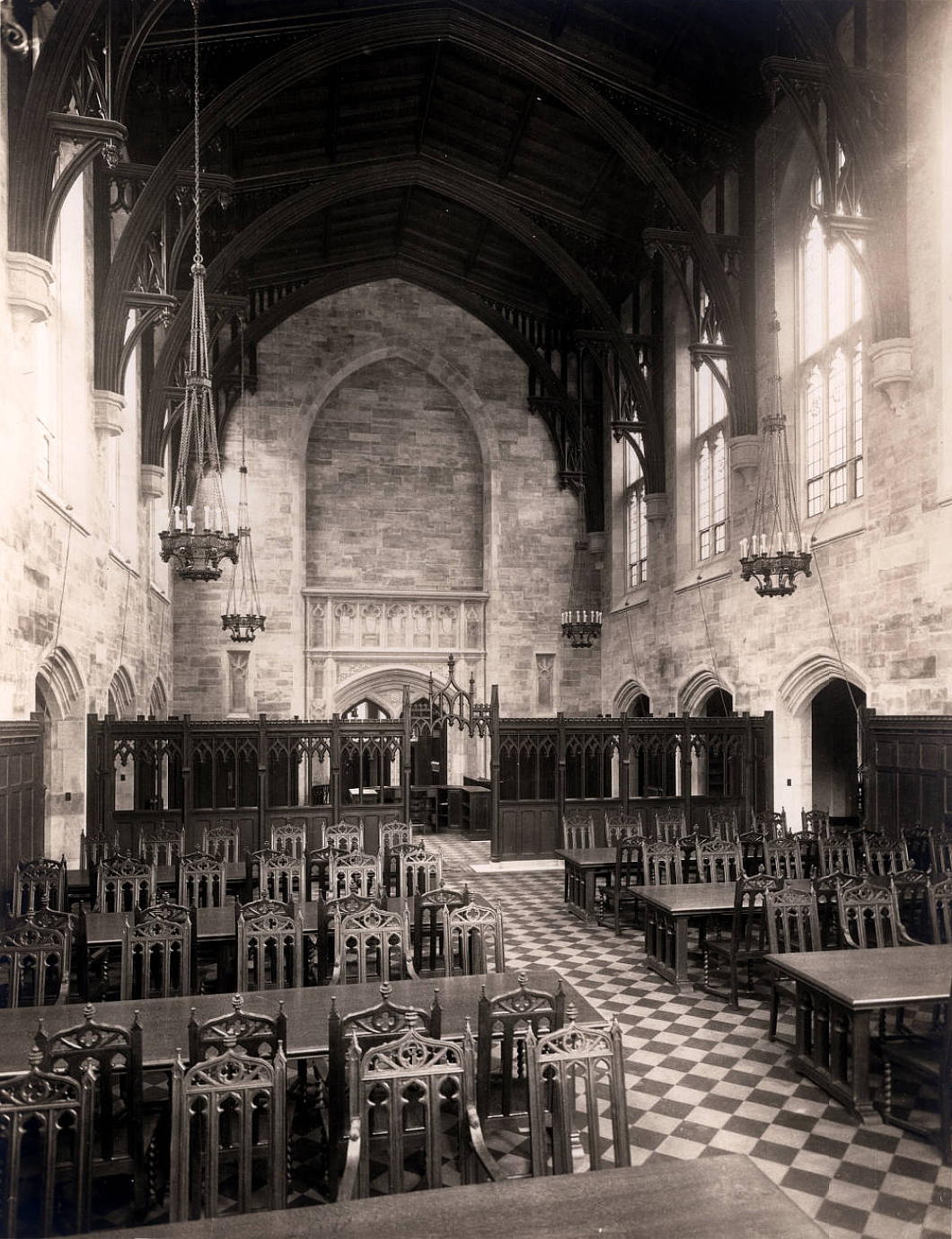
The main reading room is a fine space, and could easily have been the dining hall of an Oxbridge college or indeed a chapel dedicated to divine worship.
The tendency of interwar American architects to design libraries like cathedrals is well documented, with Yale’s Sterling Memorial Library leading the way.
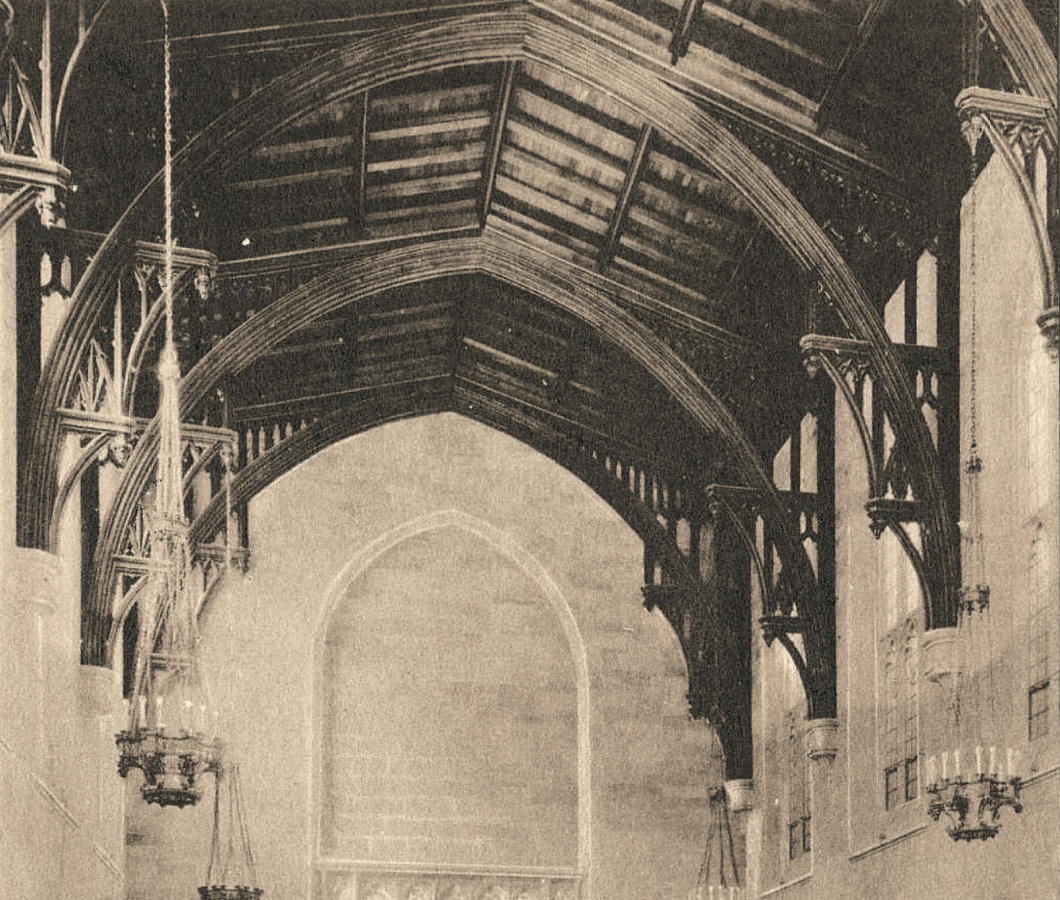
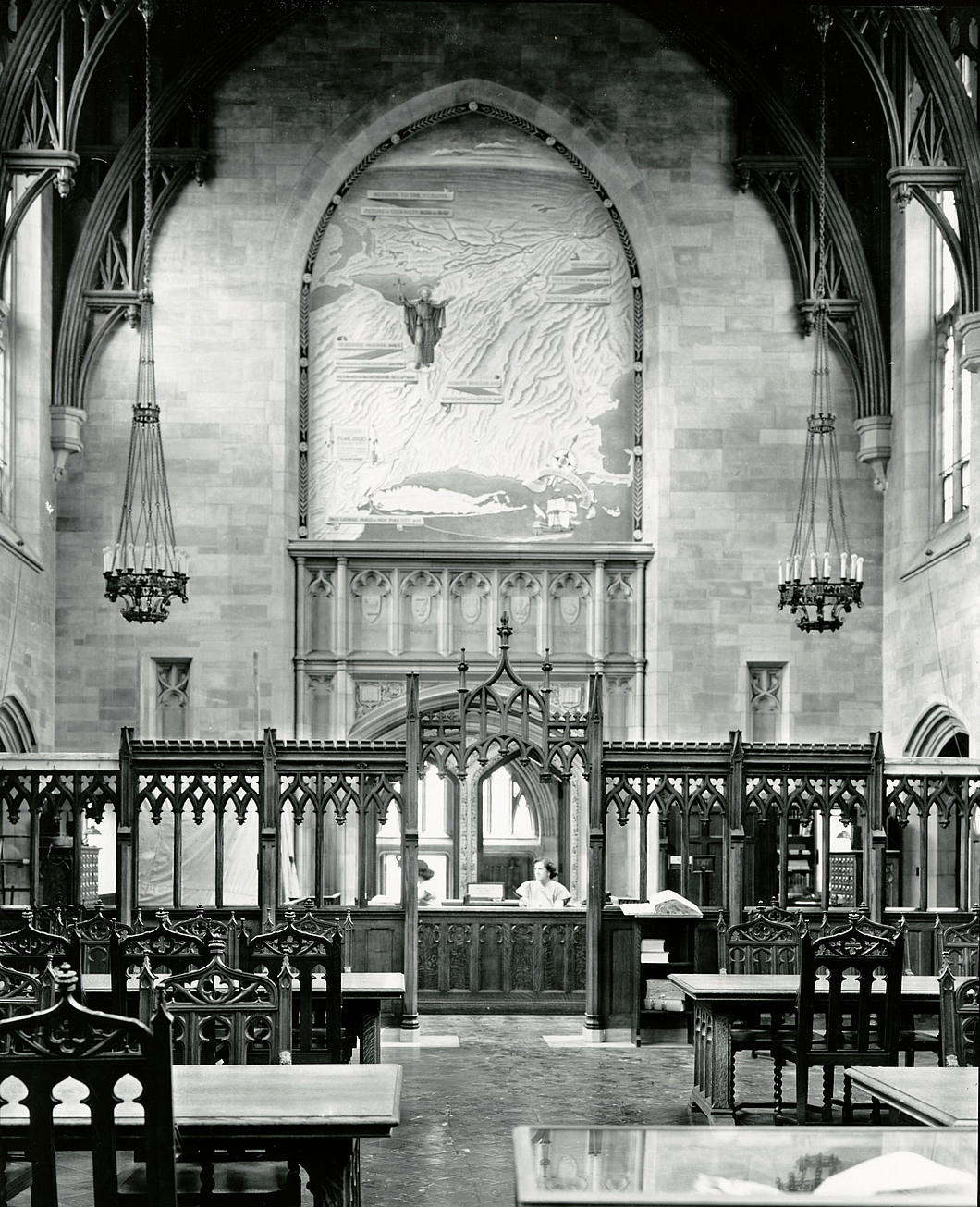
The sacral aura of the building was increased in 1949 when the mural ‘The Journeys of St Isaac Jogues in the New World’ was installed in the gothic arch of the reading room.
Jogues was the first Catholic priest to have visited the city of New York and did missionary work amongst many of the native tribes up the Hudson and beyond in New France before his martyrdom in 1646.
The muralist and designer Hildreth Meière designed this depiction of Jogues’s travels which was executed in casein and gesso relief by her collaborator Louis Ross. It was restored as part of the 2004 renovations to the building.
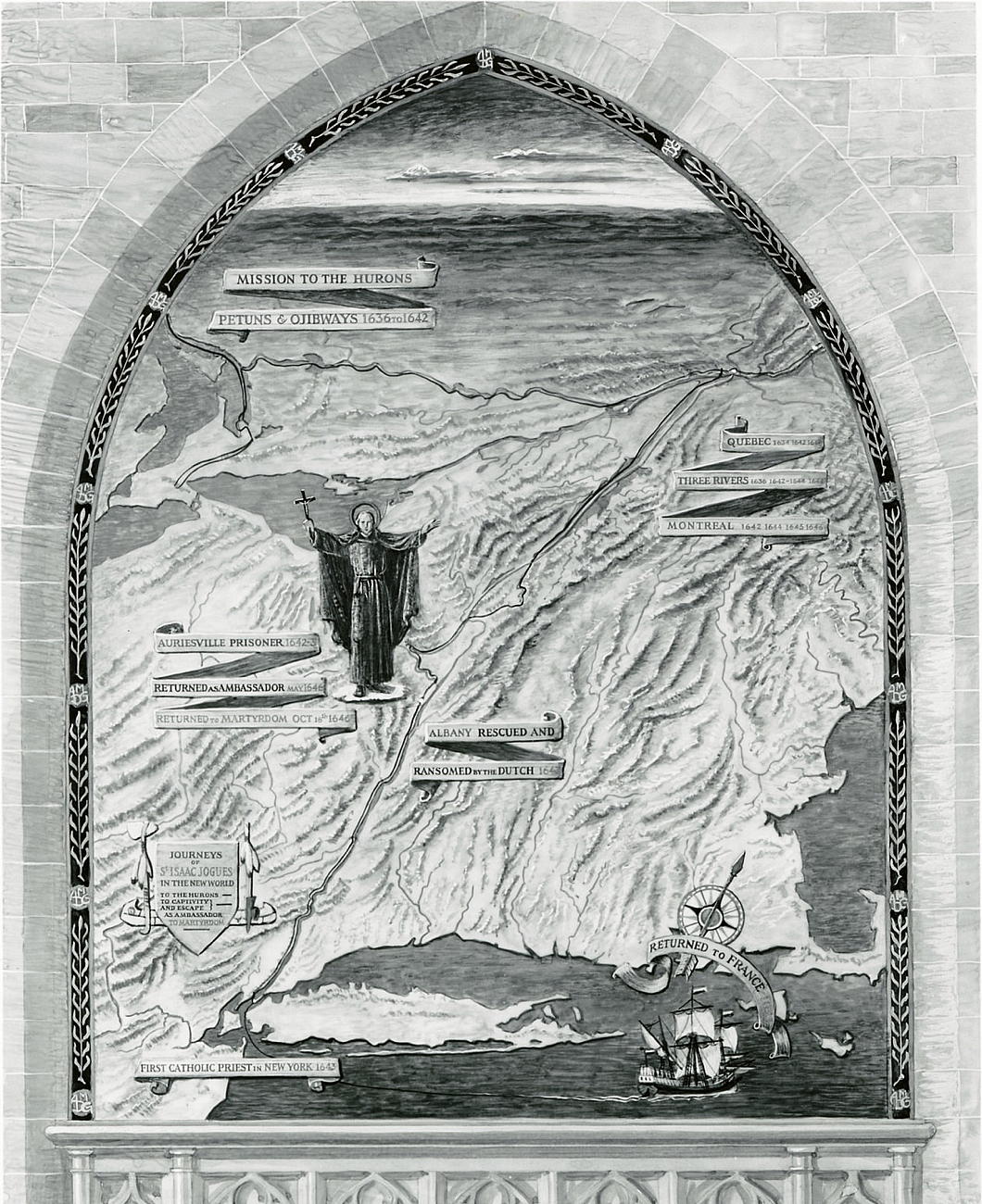
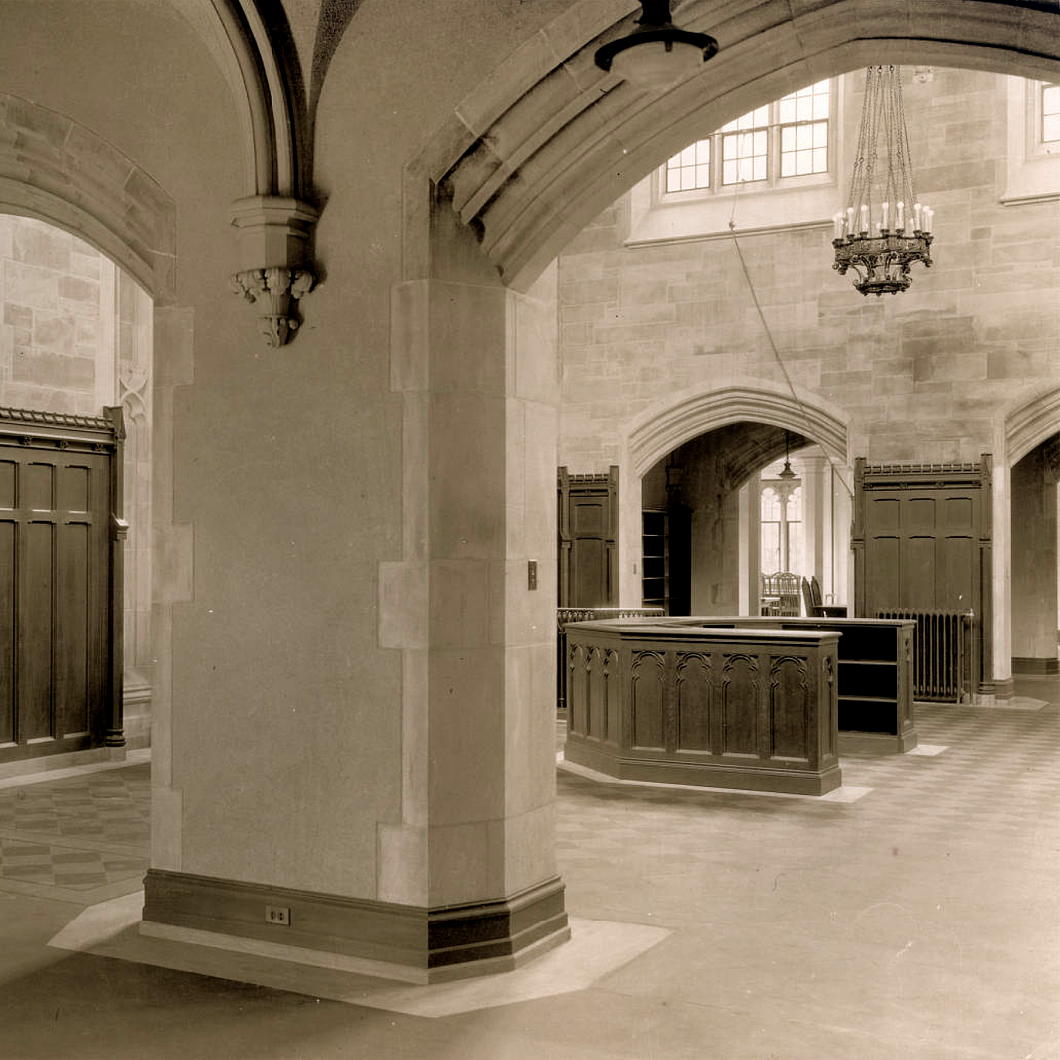
Circulation to the flanking wings of the library is through low arches that were frequently deployed in interwar American Gothic interior spaces, particularly in New York. (Viz. South Dutch Reformed Church [now Park Avenue Christian Church] in Manhattan, St Joseph’s Church in Bronxville, and elsewhere.)
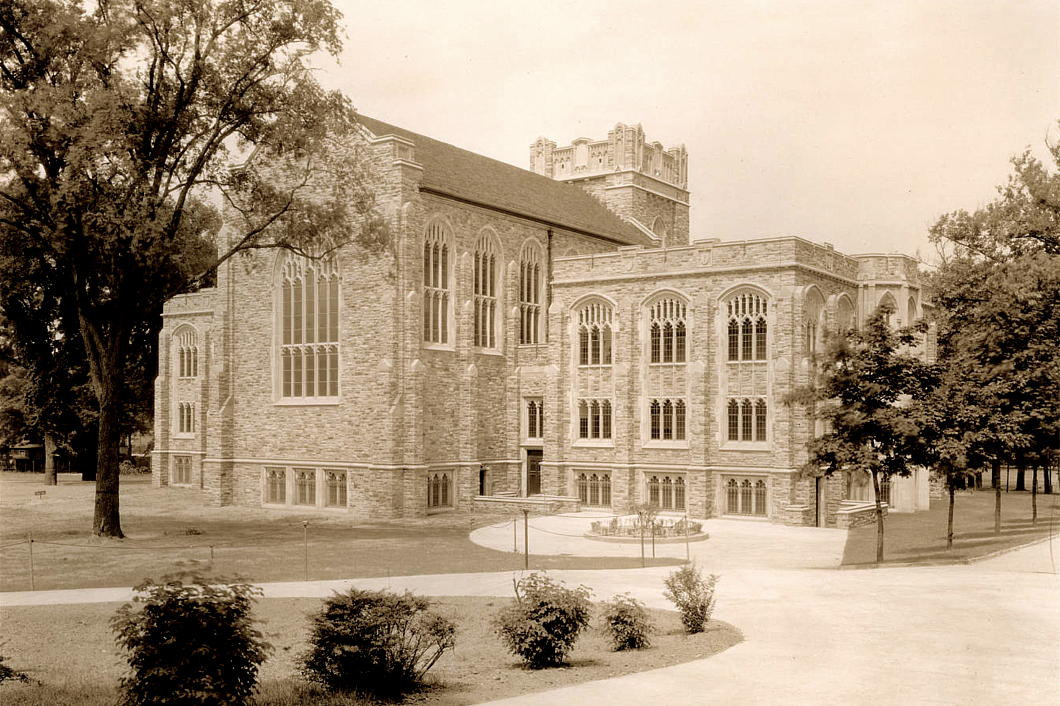
Perrot understood the ever-evolving nature of universities as academic communities and living organisms. The future of the Duane Library was not, despite its building materials, set in stone.
The architect planned the building so it could be expanded by later generations when the need arose — either outward by extending the wings or backward by building additions to the rear.
The fathers of Fordham umm’ed and ahh’ed but never got around to extending the library. Instead they crammed more and more volumes into the original footprint, adding layers of stacks that expanded into the great hall.
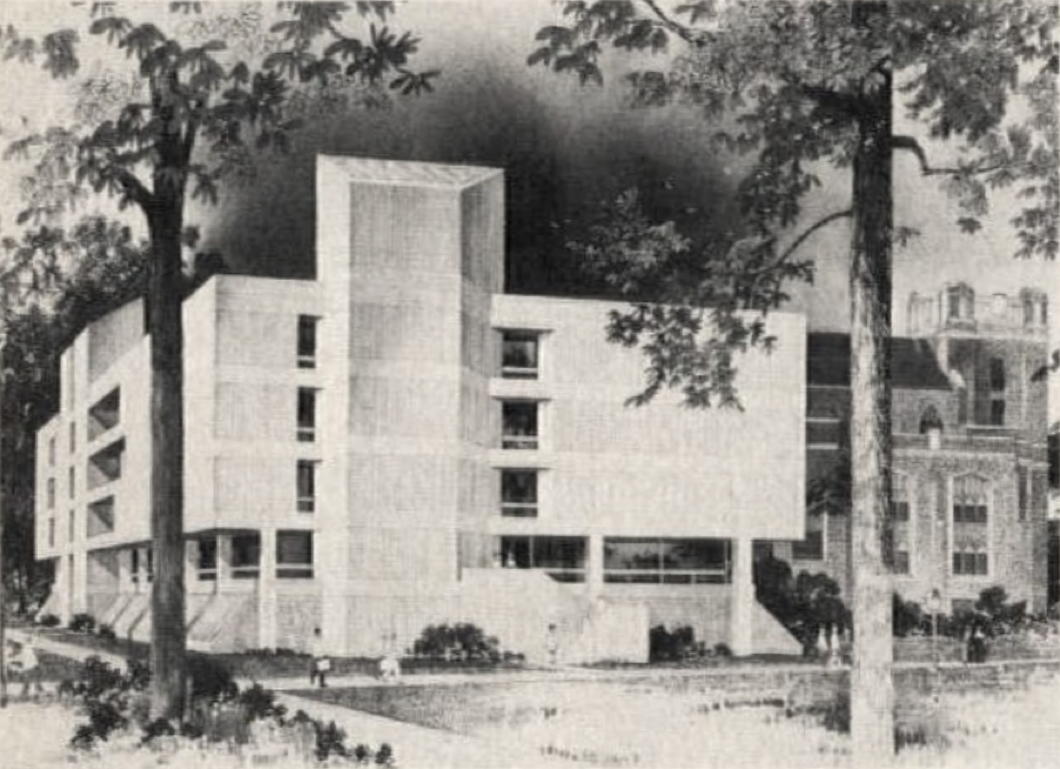
Schemes were devised, only to be shelved by economic downturns or other factors. Judging by the look of the 1968 proposal from DeYoung and Moskowitz (above), perhaps we should be glad.
In the 1990s, a massive new university library was constructed at the western corner of the campus and old Duane was left empty.
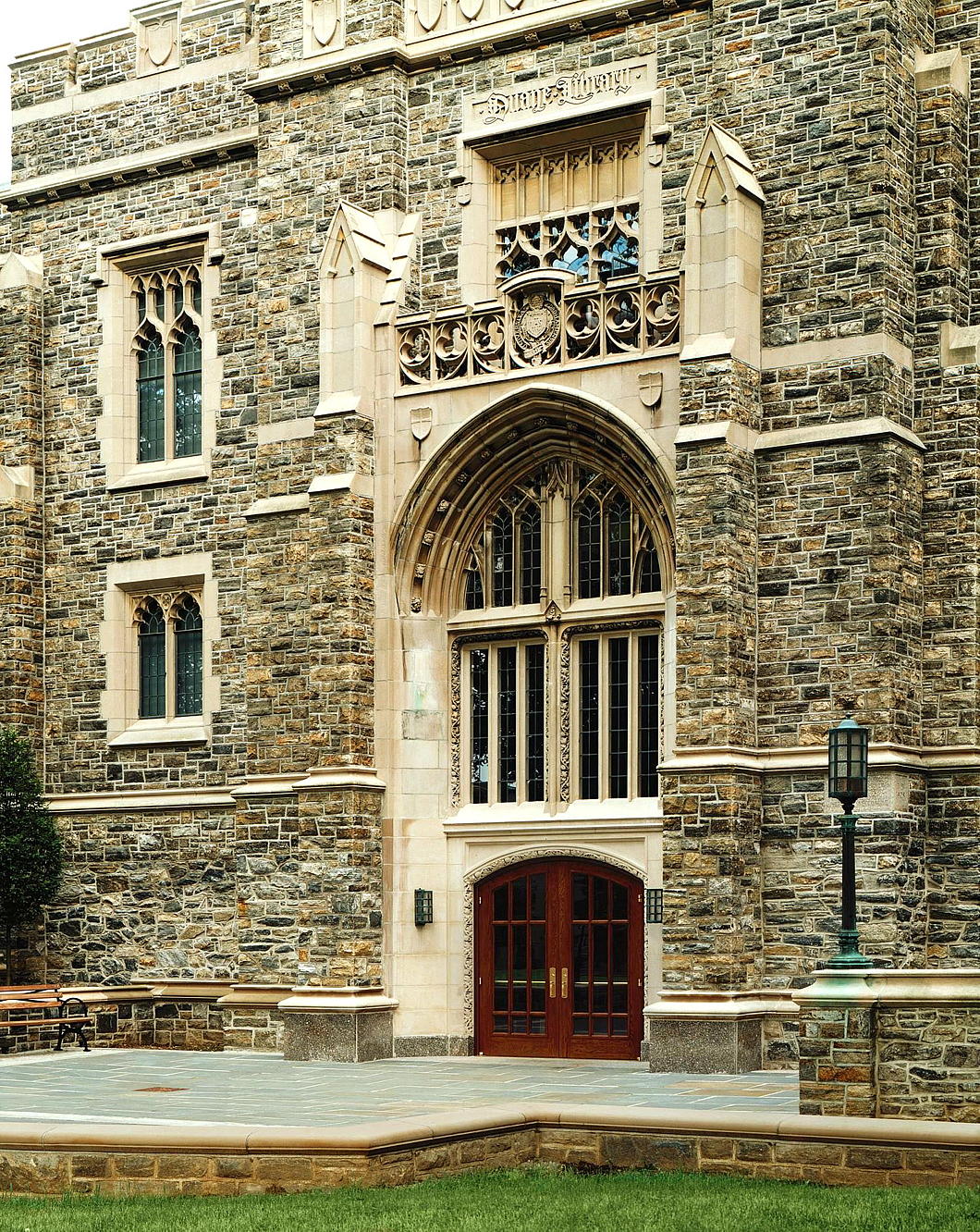
It wasn’t until 2004 that Fordham repurposed the Duane Library with a comprehensive renovation to serve as the Admissions Office and first port of call for prospective students, as well as home to the theology department.
The exterior staircase and terrace were removed and the entrance lowered to the ground level, allowing easier handicapped access but also increasing the utility of the lower level interiors.
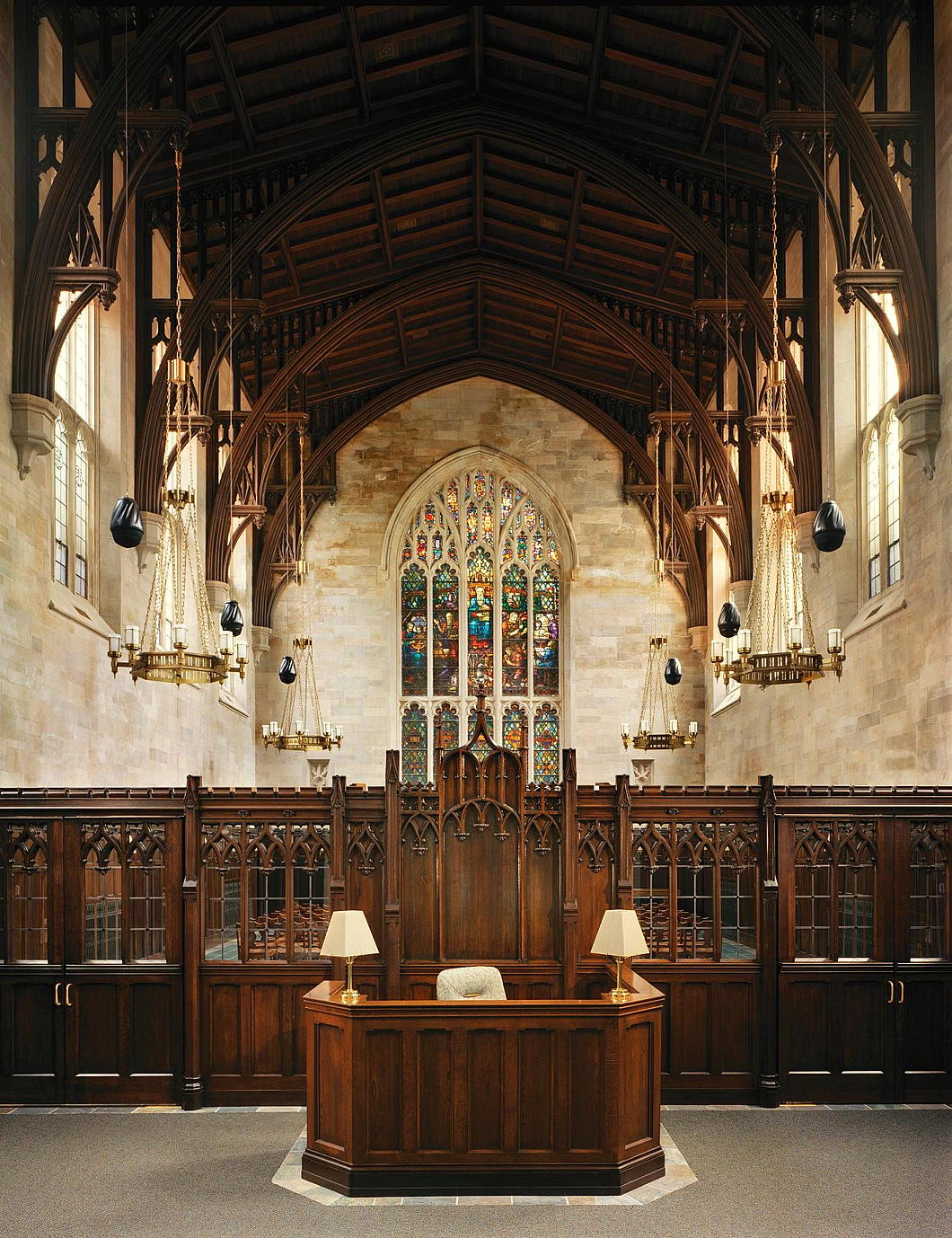
Restored to its former glory, the great hall is now used to welcome groups of visitors as well as a 140-seat performance or lecture venue.
The stained glass window was installed in 1929 as a gift from the Class of 1915, and depicts the study of philosophy, literature, astronomy, natural history, and geography.

One of the recent additions to the Duane Library is a quarter-scale replica of the ceiling of the Sistine Chapel. It was created for the 2017 exhibition ‘Michaelangelo: Divine Draftsman and Desiner’ at the Metropolitan Museum of Art.
Fr Joseph McShane was visiting the exhibition alongside a Fordham trustee, his wife, the Fordham chair of art history, and a museum administrator and said as soon as he walked into the room he wondered if he could find a home for it at Fordham.
As chance had it, while viewing the exhibition they bumped into Dr Carmen Bambach, a Met curator specialising in Italian Renaissance art who had previously been an assistant professor at Fordham.
Following the tour, the group decided to propose that the university house the copy of the ceiling once the exhibition was finished. “Much to my surprise,” Fr McShane said, “we were informed a few weeks later that the Met approved our proposal.”
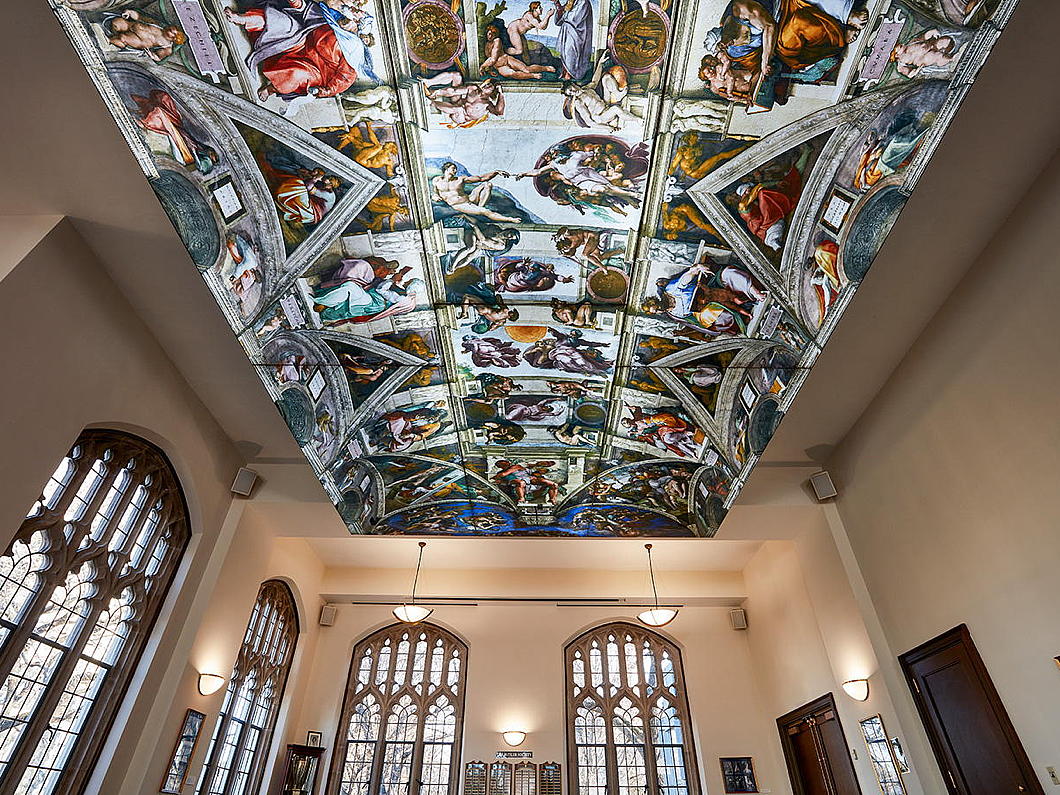
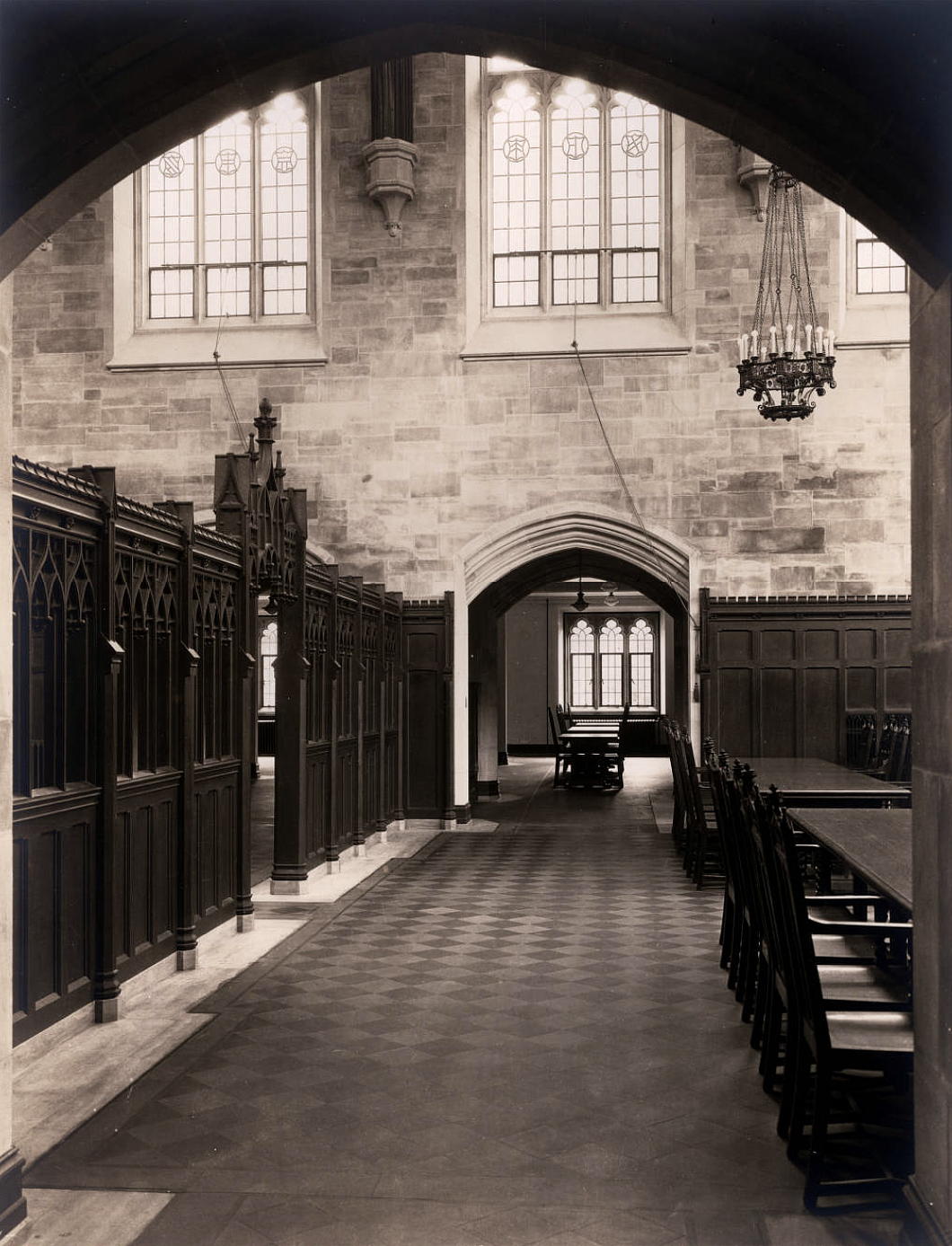
Taking inspiration from Prof Milbank’s earlier-mentioned comments about gothic literature, we could hardly visit the ancient manor of Fordham and the former library of its Gothic university without taking in a ghost story.
On a Sunday night before a final exam, an economics student was studying late in the Duane Library and was the last person left on the floor. Suddenly he heard the sound of footsteps and peeked outside his cubicle. He saw an old priest with a kindly face so he said hello to him.
The priest introduced himself as Father John Shea and asked what he was doing in the library so late. The student explained that he had an economics exam he was studying for. “Oh!” said the priest. “I used to teach economics here. But I haven’t taught in three years.”
The priest asked if the student would carry on to do a PhD but he said no, he was planning to go to law school instead and had already heard back from Georgetown. “Good school! I got my doctorate there,” the priest offered.
After a few minutes of pleasantries, the student ended the conversation and returned to his studies.
Following the exam the next day, he was in the economics department and, chatting with the departmental secretary, he mentioned that he had met Father John Shea the night before. The secretary told him he must be joking because Father Shea had been dead two or three years.
A look in an old departmental catalogue confirmed that the good father had indeed obtained his doctorate from Georgetown and a picture of Father Shea looked like the priest the student saw.
As luck would have it, in 2012 another Fr John Shea was appointed to Fordham College at Lincoln Center, making him the third Jesuit of this moniker at Fordham since John Gilmary Shea.
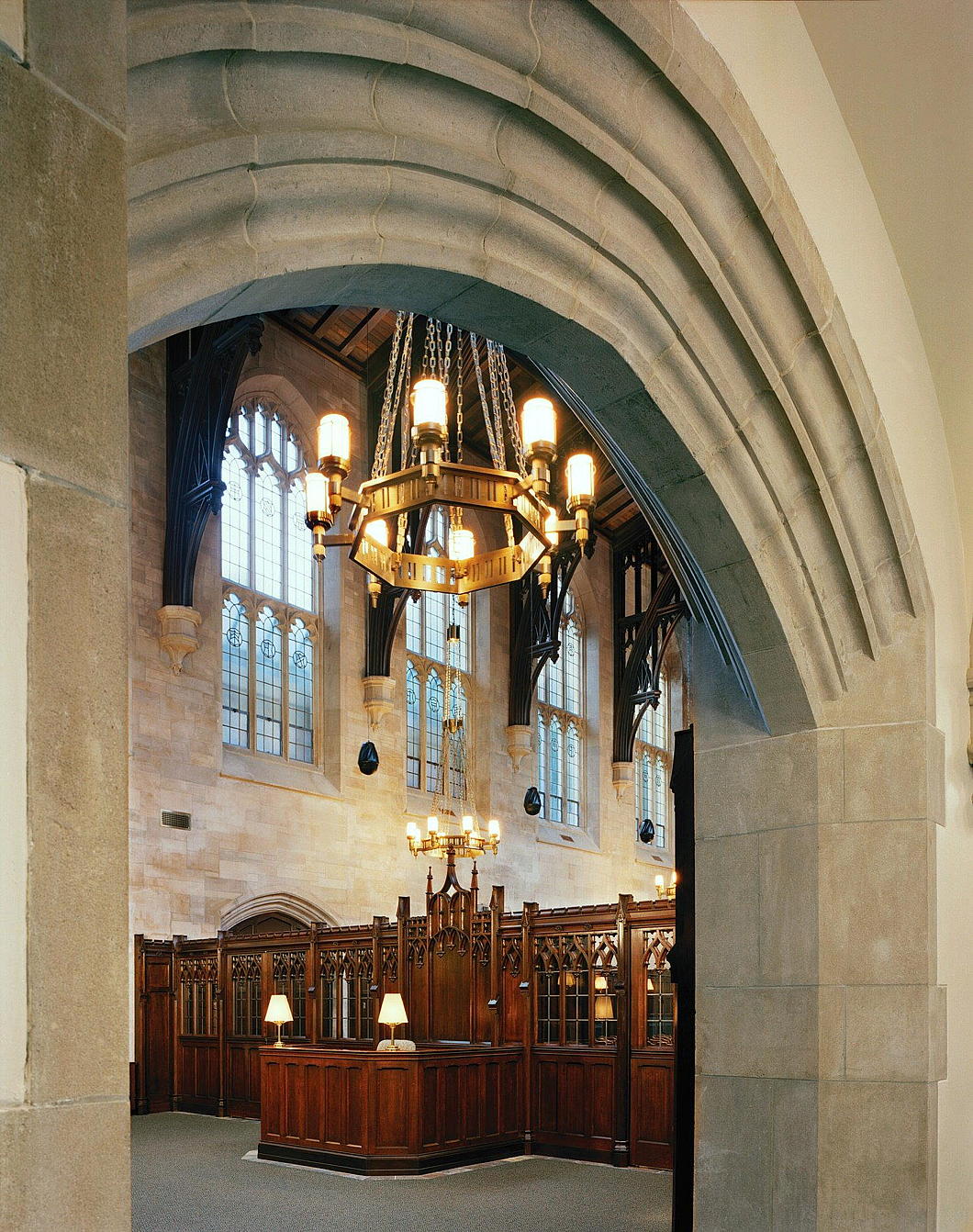
As the admissions office and theology school, any ghosts still haunting the Duane Library will have plenty of new visitors to meet as well as learned scholars to discourse with.
And while Fordham may be haunted, it is good to know its ghosts are friendly rather than fearsome.
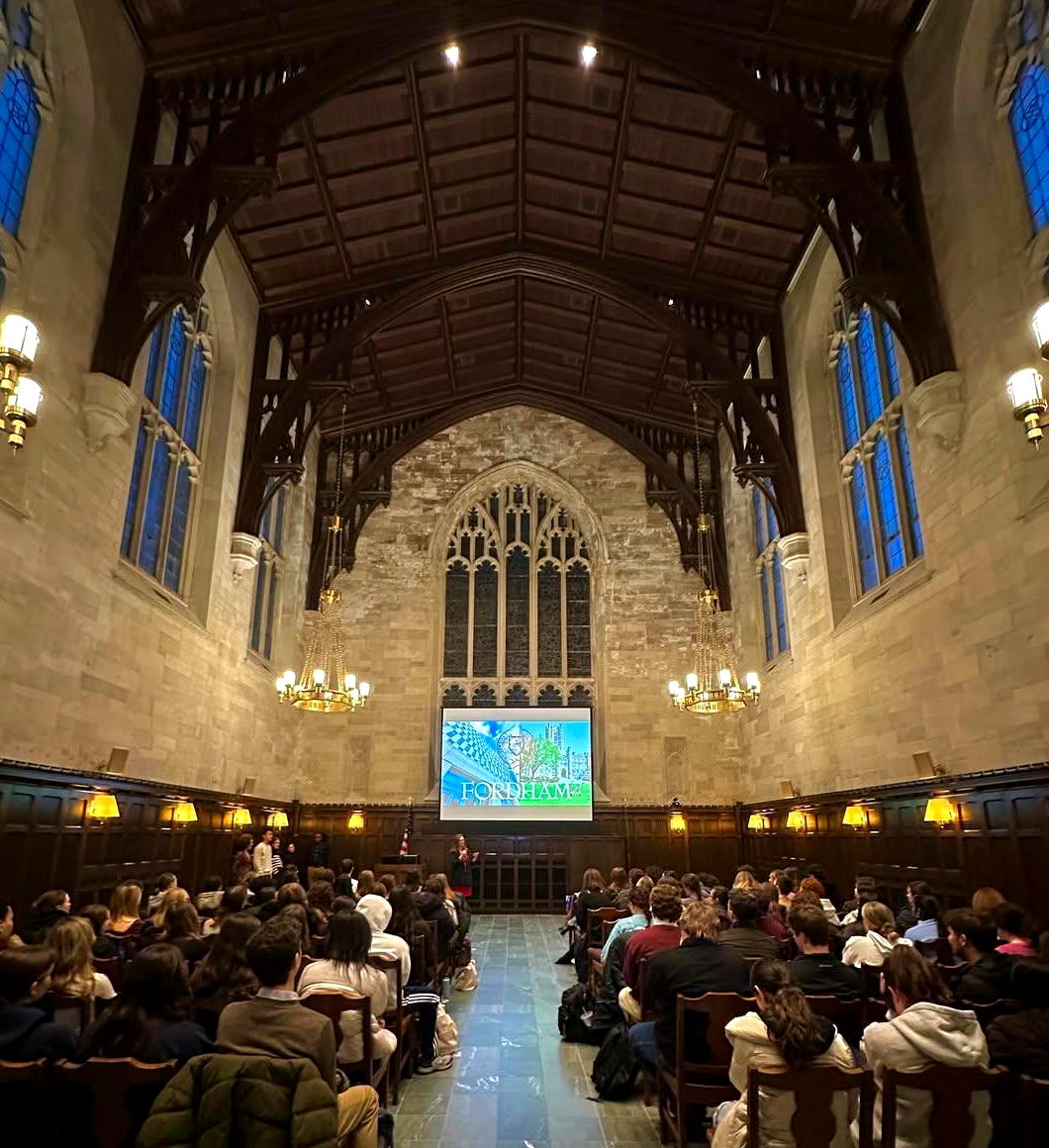
Christ Church

Christ Church
Lancaster County, Commonwealth of Virginia
Nonetheless, this gem of the American Georgian building arts — designed by an unknown hand — is an almost miraculous survival.
It was built 1732-35 by Col. Robert “King” Carter, the planter and merchant lord who served as Speaker of the House of Burgesses, President of Virginia’s Privy Council (the Governor’s Council or Council of State), and eventually Acting Governor of the Dominion.
The regal moniker by which he was known reflected the wealth and power he obtained in the colony, and Christ Church was constructed to serve Carter’s country seat at Corotoman.
The substantial mansion had burned down in 1729 but Carter carried on, living in the dower house of the estate. Such was his wealth that the fire barely featured in his diary, though he much lamented the complete loss of the wine cellar.
Christ Church had no natural parish and the loss of supporting glebe lands after the Church of England was disestablished in Virginia in 1786 removed the main source of funds to maintain the church.
It was only intermittently used during the nineteenth century, but in 1927 the Association for the Preservation of Virginia Antiquities took charge of the site and began restoring Christ Church.
In 1958 that esteemed body erected the Foundation for Historic Christ Church which has devoted its attention and resources to the care of this Georgian treasure ever since.
This work has by no means been limited to architectural preservation: the Foundation promotes scholarly research on the Carters, the world of the Virginia plantations, and every aspect thereof, in addition to operating a museum on the site to explain Christ Church to visitors and travellers.
Thanks to the efforts of Edmund Berkeley Jr (1937-2020) — who carried on the work of his uncle Francis L. Berkeley (1911-2003) on Virginia’s colonial papers — the surviving diary, correspondence, and papers of “King” Carter are now in the care of the Historic Christ Church museum.
Most importantly, God is still worshipped in some form at Christ Church: the Episcopalian congregation in Kilmarnock, Va., holds Sunday morning services here from June through September according to ‘Rite One’ of the Protestant Episcopal Church’s Book of Common Prayer.
The church is best approached through the simple avenue of cedar trees that leads the visitor straight to Christ Church’s west door.
It looks particularly cozy in winter.

and Michael Kotrady via Wikimedia Commons (modified).
A Christmas Gift from the Governor
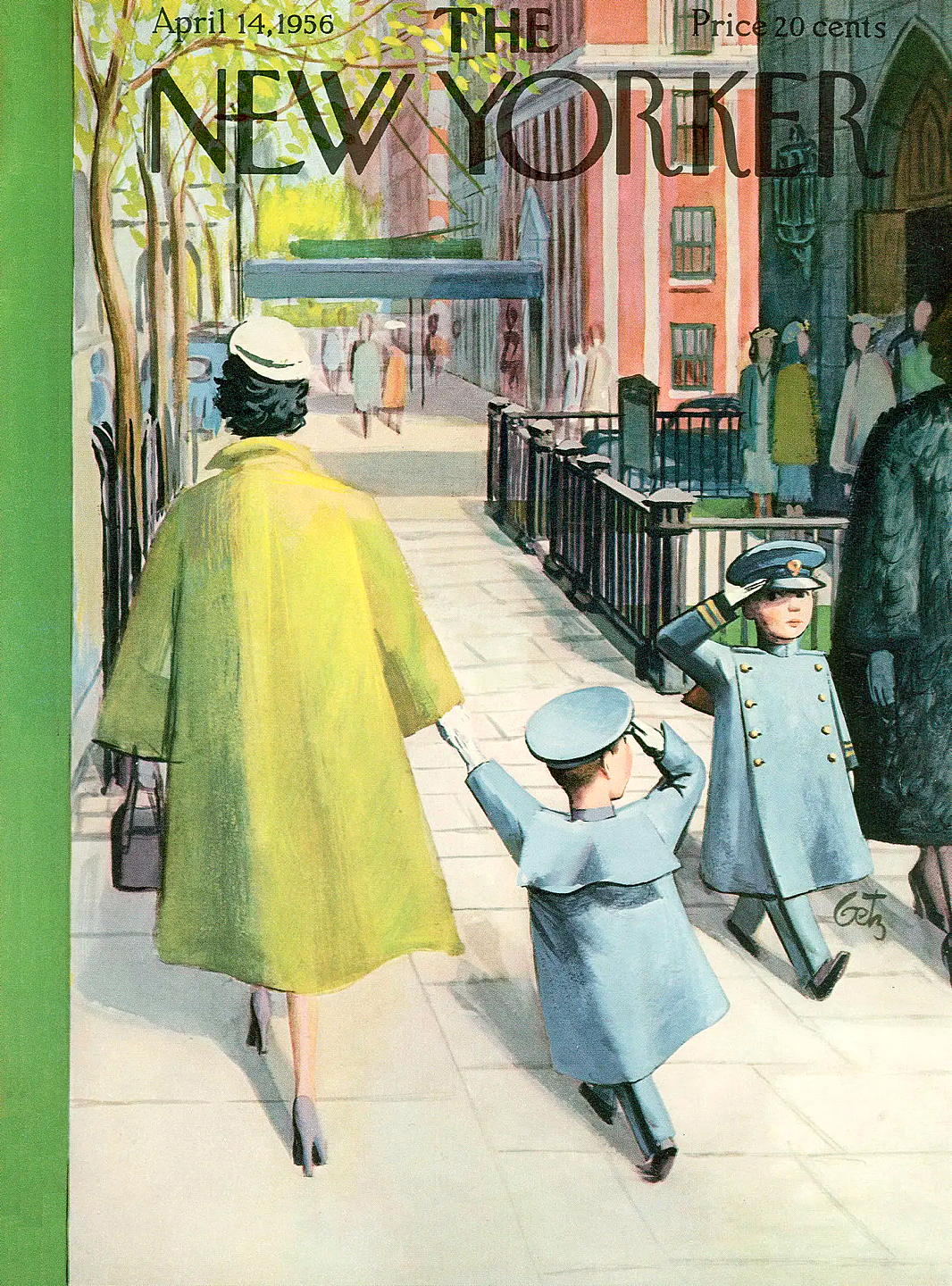
Just in time for Christmas: some excellent news for the Knickerbocker Greys.
Her Excellency the Governor of the great Empire State of New York has signed into law a requirement that this venerable Manhattan cadet corps be allowed to remain in its quarters at the old Seventh Regiment Armory (as The New York Sun reports).
Over recent years the Park Avenue Conservancy has restored the building — a gem of American architecture and interior design — but also effectively expelled the military units still based at the Armory.
The Greys managed to hold out in their “800-square-foot broom closet” (as the New York Post described it) but the Conservancy moved to evict the youth group in 2022. The Greys have fought the eviction in court.
In June a bipartisan bill guaranteeing the Knickerbocker Greys “access and use for permanent headquarters” of the Armory “for the purposes of programming during periods which are not periods of civil or military emergency” passed in the State Assembly and Senate but has only now been signed into law.
The hope is this new legislation will persuade the Conservancy to drop their eviction proceedings which the Greys have been challenging.

Gellner’s Prague

He was Professor of Philosophy, Logic, and Scientific Method at the London School of Economics before heading to Cambridge to become the William Wyse Professor of Social Anthropology. With the Velvet Revolution and the fall of communism, Gellner returned to his native Prague as head of the new Centre for the Study of Nationalism there.
Gellner had many intellectual enemies — proponents of linguistic philosophy, Western Marxists, the post-colonialist offspring of Edward Saïd — but his hard-hitting attacks on them were often tempered by good humour and a skilful ability to tell a joke that only further infuriated his opponents.
The sociologist David Glass once said that he wasn’t sure whether the next revolution would come from the right or from the left, but he was quite sure that wherever it came from the first person to be shot would be Ernest Gellner.
Despite living most of life in exile, Gellner was above all a child of old Prague. Professor Stefan Collini explored the professor’s background in Bohemia in the LRB:
His parents were assimilated German-speaking Jews, Habsburg subjects before 1919, and thereafter citizens of the new state of Czechoslovakia (where it seemed wise to speak Czech, at least in public).
Prague in the interwar years was cosmopolitan even by the standards of Central Europe: alongside Czech schools, it could boast German gymnasia, Russian and French lycées, and an English grammar school.
It was to the last that his parents sent the nine-year-old Ernest in 1935, perhaps prudently preparing for a time when they would have to flee mainland Europe. They almost left it too late; they were fortunate to make it to England in April 1939, eventually settling in Highgate.
Gellner’s parents were representative of that stratum of educated, middle-class Jews who, profoundly grateful to Britain for providing them with a home, nonetheless continued throughout the war to speak to each other in the language of the now hated enemy.

Before his 1995 death, Gellner was interviewed by John Davis for the February 1991 issue of Current Anthropology.
In the exchange, he touched upon his relationship with Prague, the “Crown of the Realm”.
EAG: My family lived in Prague, and we were deeply urban, yes.
JD: Was Prague particularly anti-Semitic?
EAG: Yes. Very openly so in the working class, nauncé elsewhere.
This was Kafka’s Prague: tricultural, with two universities, a Czech and a German. The German university was very, very distinguished and had at one time Carnap and Einstein and so on, and of course benefited from Hitler by the influx of scholars. Two universities and three cultures and ethnic tension was certainly very emphatically part of it. I mean: if you are asking me whether this was a crucial part of my environment in Prague, then the answer is yes.
It’s a stunningly beautiful town, and during the first period of my exile, which was during the war, I constantly used to dream about it, in the literal sense: it was a strong longing. We came to England in 1939 after the German occupation of Prague.

EAG: One of my main recollections of Prague in ’45 was a communist poster saying “everyone with a clean shield into the Party,” that is, everyone whose record was good during the Occupation.
It meant in reality exactly the opposite: “If your shield is absolutely filthy we’ll scrub it for you; you are safe with us; we like you the better because the filthier your record the more we have a hold on you.” So all the bastards, all the distinctive authoritarian personalities, rapidly went into the Party, and it rapidly acquired this kind of character.
So what was coming was totally clear to me, and it cured me of the emotional hold which Prague had previously had over me. I could foresee that a Stalinoid dictatorship was due: it came in ’48. The precise date I couldn’t foresee, but that it was due to come was absolutely obvious for various reasons.
Above all, in ’45 the Czechs expelled 3,000,000 Germans with considerable brutality. I think the estimate of the number of killed in the process was 200,000 thought I don’t know how reliable that is. And at the same time everyone was scared stiff of the Germans and remembered Munich, so they handed themselves bound and helpless to Stalin as the only protection against the German revanchism which they confidently expected at the time.
They don’t expect it now, interestingly enough; but they did then. All this occurred in conjunction with the quite skilful communist exploitation of the situation. And I wanted no part of it and got out as quickly as I could and forgot about it.

Monsieur Bayrou
Monsieur le président has appointed François Bayrou as Prime Minister of France – for how long, who knows.
It is worth revisiting the assessment of him the late Maurice Druon (1918-2009) published in the pages of Le Figaro in 2004:
Monsieur François Bayrou, a secondary character and destined to remain so, is remarkable only for his perseverance in undermining the higher interests of France. He eminently possesses what the English call ‘nuisance value’.
At what point did his self-image begin to cloud his judgement? Here is a Béarnais, the son of a farmer, who, gifted for studies, became an agrégé in classical literature. At twenty-eight, he took his first steps in politics by entering the office of Monsieur Méhaignerie, Minister of Agriculture. At the same time, he joined the centrist party that Giscard d’Estaing created to serve his personal elevation. This party, which participated in overthrowing General de Gaulle in 1969, would become the UDF.
Monsieur Bayrou settled there and prospered. He was elected general councillor in his native department, then regional councillor. He was also an advisor to Monsieur Pierre Pfimlin, to the presidency of the European Assembly. Monsieur Pfimlin was an excellent man in every respect, who exercised very high functions with rectitude. He had only one fault: he was a centrist, that is to say, like all centrists, he was mistaken about the hierarchy of values.
He is credited with having made Paris lose its status as the capital of Europe. Indeed, it was agreed between Adenauer and de Gaulle that the institutions of the European Community would have their headquarters nearby. A large complex would be built in the near Paris region. On this, Pfimlin, an Alsatian, intervened, proclaiming: “Strasbourg, Strasbourg… the link between France and Germany, between the two cultures… reconciliation… Strasbourg, a symbolic city!” Could Alsace be insulted? The Parisian project was shelved.
The move was well-intentioned, but it was a misjudgement.
Paris, a great metropolis of the arts and business, as well as an international communications centre, had all the attractions for Members of the European Parliament, diplomats, and civil servants; Strasbourg, beautiful but provincial, with limited entertainment and above all poorly served, requiring changes of plane to reach its often foggy aerodrome, exercised little charm on the new community population. If the monthly sessions of Parliament – at what cost and for how long? – continue to be held there, everything else, commissions and services, has moved to Brussels and it is Brussels that has become the administrative capital of the Union.
Let us return to Monsieur Bayrou, who is following a fairly typical political path. Elected to parliament, he quickly showed a ministerial appetite by making education issues a specialty. He founded and chaired a permanent group to combat illiteracy. A laudable program. Unfortunately, during the time he was Minister of National Education, illiteracy continued to increase and the general level of education continued to decline. Was it during this period that he experienced a somewhat excessive expansion of his ego?
It is said that one night he woke up the members of his cabinet, urgently summoning them to the ministry, to consult them on a vision he had just had of his presidential future. The anecdote has been circulated with too much insistence for there not to be, at its origin, some reality.
Why am I dwelling so long on Monsieur Bayrou, when we have concerns that seem to be of greater importance? It is because, not content with creating disorder in our domestic policy, he is currently acting contrary to the interests of France in the European Parliament.
Monsieur Bayrou is a candidate for the presidency of the Republic: we know that. He has made it known urbi et orbi and, stubbornness being in his nature, there is every reason to believe that he will be one for life. He also ran in 2002 and, having arrived at the back of the pack, with 6.8%, he immediately put on the jersey with the bib number marked 2007.
Assuring that he is part of the majority in the National Assembly in order to keep his electorate, he keeps his parliamentary group on the fringes, under the pretext of refusing corporatisation; he never stops criticizing the government’s actions, often using the opposition’s arguments, and only votes for it with his fingertips, when he does not abstain, visibly waiting for its fall. Beautiful political logic! This is what Monsieur Bayrou calls cultivating one’s difference. When one benefits from such great support, one ends up preferring adversaries.
His programme? It is made up of nothing but worn-out words and formulas that have become hollow from being used too much. It is as if we had returned to the “more just, more humane Republic” of thirty years ago. Everything ages – even demagoguery. […]
What a waste! And all in keeping. Those who stick around François Bayrou for career interests, like those who stay there out of personal loyalty, expose themselves to serious disappointments.
In politics, I have no other criteria than services rendered to the country.
Prince Talleyrand said: “Without wealth, a nation is only poor; without patriotism, it is a poor nation.”

Dempsey Heiner, Art Critic
Dempsey Heiner was neither coward nor fool: he lied about his age to join the U.S. Navy during the Second World War and later studied at Harvard, Yale, and the Sorbonne. His schoolmate from St Bernard’s days, the Paris Review founder George Plimpton, described him as “the brightest boy in the class, a genius”.
In addition to his wide reading and erudition (which he wore very lightly), Dempsey was also one of the kindest, gentlest creatures the world has ever known. He spent most of his life uncomplainingly caring for his disabled wife day in and day out for decades. By the end, she was immobile, blind, and nearly comatose.
As his parish priest put it, “Not once did I ever hear him speak of her as anything but a blessing… and he seemed never so joyful as when he tried to make her drink through a straw.”
He died in 2008 and I still think it was one of the greatest privileges in my life to have counted him amongst my friends.
Dempsey’s most famous act — one would be tempted to use a bit of New York tabloid hyperbole and say most notorious act — occurred on this week in 1999. It is might best be described as the nexus between filial piety and art criticism.
In the late 1990s, Charles Saatchi put on an exhibition at the Royal Academy entitled ‘Sensation’ displaying works from his own collection produced by ‘Young British Artists’ or YBAs. The show was largely an act of self-promotion and the Royal Academy was accused of collaborating with Saatchi to increase the value of his own collection for eventual re-sale.
Among the works on display was a depiction of the Blessed Virgin which was surrounded by pictures cut out of pornographic magazines, although the press tended to centre in on the artist’s use of cow dung in the painting.
By 1999, Saatchi’s exhibition had crossed the Atlantic where it found a temporary home at the Brooklyn Museum. Despite being one of the best collections of art in the United States, the Brooklyn Museum has suffered somewhat from its borough’s perception as something of a bag-carrier for the more glamorous neighbouring isle of Manhattan.
Dempsey, a convert to Catholicism, had a profound devotion to the Blessed Virgin. He wasn’t keen on the idea of some art-market scheme profaning the image of the Mother God, so in December 1999 the 72-year-old New Yorker bought a bottle of latex paint, smuggled it into the Brooklyn Museum, and daubed the paint on the insulting artwork.
As luck would have it, the Magnum photographer Phillip Jones Griffiths was visiting the museum with his daughter and was in the room when Dempsey began his rather pro-active work of art criticism. Jones Griffiths caught Dempsey in the act with his camera and the next day the image was splayed on the front page of the New York Post.

The security guards detained him pending the arrived of New York’s finest, but Dempsey told me that once his police escort was out of view of museum officials they each patted him on the back and congratulated him for his deed.
Dempsey’s act of defiance was almost certainly a felony-level offense but, as the Museum did not want to put a value to the artwork, the Brooklyn DA’s office felt obliged to reduce the charge to a misdemeanour — still carrying the possibility of up to two years in prison.
At trial, Dempsey said the exhibition’s gravest sin was neither blasphemy nor profanation but its “suggestion that there is no beauty in the world.”
“It’s like what Jean-Paul Sartre said: ‘L’enfer, c’est les autres’,” he told the court. “I reject Sartre’s view of humanity. Art is also supposed to be about skill. There was none of that in ‘Sensation.’”
A spokeswoman for the Brooklyn Museum deployed almost comical de haut en bas at the trial: “I don’t think we’ll respond formally to Mr. Heiner, beyond pondering what in his background makes him an expert on artistic skill.” (His Yale degree was in law and his Sorbonne degree in medicine, so I’m not sure if Dempsey ever formally studied art.)
One of the museumgoers in the room at the time told the Post that, while he disagreed with the vandalism, he “understood” Dempsey’s reaction: “Someone had to stand up and say, ‘This is not right.’”
“I think it was heroic,” our own Irene Callaghan (who died this year) told the Post. “He did it for all the Christians. I’m sure if he smeared paint on the window of a fur shop everyone would think it was marvellous.”
In the end, as the Post reported, Dempsey escaped a prison sentence:
Calling it a “crime not of hate, but of love,” a Brooklyn judge slapped a $250 fine on the man who defaced a dung-daubed image of the Virgin Mary, instead of tougher penalties prosecutors sought.
State Supreme Court Justice Thomas Farber released Dennis Heiner with the fine on the condition that “so long as he has paint in his hands, he’s required to stay away from the Brooklyn Museum.”
Farber, who has called the Heiner case one of the most difficult of his career, said the frail, gentlemanly Roman Catholic advocate had taught him something new.
“I had assumed that an act like this would always be committed by an angry man motivated by hate,” Farber said. “But this was a crime committed not out of hate but out of love for the Virgin Mary.”
“When the row eventually fades,” the then-editor of Art & Auction magazine, Bruce Wolmer, wrote, “the only smile will be on the face of Charles Saatchi, a master self-promoter.”
Saatchi made a mint off the artworks he sold, sparking criticism of museum institutions’ alleged complicity in inflating the prices of YBA works.
What happened to the offensive painting? Heavily insured, it was lost unto the ages in a warehouse fire. None of the art world figures who chimed in to praise it at the time mourned its passing. Sic transit opprobrium mundi.
Dempsey himself had no regrets, but he said he wouldn’t engage in any more public acts of paint smearing.
“I’m too old,” he told the press, chuckling. “I’ve said my piece.”
May he rest in peace.

Vote AR

The lush and verdant tree formed in the shape of the Netherlands grows from deep roots spelling out ‘AR’, the name of the main Protestant party — once led by Abraham Kuyper.
As Kamps and Voerman point out in their book on posters from the Dutch Christian-democratic tradition (in print / online), this poster is a “rather complicated allegorical representation”.
Articles of Note: 12 December 2024

Luttwak first came to my attention when, about 10 or 11 years old, I was given a copy of Coup d’État: A Practical Handbook (I think one of the many I received from my relation Henry, R.I.P.). He has been interesting at every turn I have had to read him or his thoughts ever since.
Santi Ruiz of Statecraft has released a delicious new interview with Luttwak.
“Coups had been very common until about two years after the book was published, and then stopped,” Luttwak contends. “The reason is that authorities everywhere reverse-engineered the book. The book was published in English, and it was immediately translated into about 13 languages. It went all over the place. I think what happened is that people learned to reverse engineer.”
He relates the story of Gen. Oufkir’s attempted coup against Hassan II of Morocco: “Oufkir bled to death, and he did so over a copy of my book.”
Luttwak’s explanation of the Islamic Republic of Iran’s manipulation of the Israeli-Palestinian conflict to assert racial dominance over the Arabs is sharp.
■ Ever since school days, we are Argentinophiles. The Financial Times, of all people, has a helpful “long read” examining the surprising successes of President Javier Milei.
■ Dr Katherine Bayford writes on the rift that doomed the American Confederacy.
■ Dan Hitchens reviews the film ‘Conclave’.
■ Niall Gooch is always reliable on railways. He compares Britain’s rail woes with the experience of our continental neighbours and concludes that we are still in for difficulties:
Culture is just so hard to prod in a positive direction; people get stuck in their ways, and find it hard to move the assumptions and perspectives which dominate beyond the station forecourt. Yet, shifting the dial isn’t impossible, if the will is there, and this is yet another arena in which British offerings can improve.
■ The prospective — all though not yet assured — loss of London’s Smithfields Market is a portent of doom for the metropolis, Sebastian Milbank prophesies.
One day, I believe, we will have to reclaim London for England, and create an economics of human flourishing rather than of usurious speculation and rent-seeking.
He is right, of course, and I think this will happen, but the English are slow movers and our political class is pretty immured from the ideas and thinking going on below.
The emerging consensus hasn’t yet reached up to those actually making decisions, and it may be five or ten years before it does. Much more damage can be done in the mean time.
■ “Turning back the clock is proverbially impossible in history,” Wessie du Toit writes, “but apparently not in architecture.” An exploration of the architectural ambitions of Viktor Orban.
■ We are well into the preparatory tide of Advent. The ever-estimable Eleanor Parker reminds of Conditor Alme Siderum, one of the office hymns of this season.
The Secret Chapel of Harkness Tower

Yale’s Harkness Tower is, by my estimate, the finest tower in the United States and its designer, James Gamble Rogers, one of the best American architects of his day. JGR is in the Pantheon of his craft, though not quite as highly appreciated as Bertram Grosvenor Goodhue or Ralph Adams Cram.
Harkness Tower is a monument to verticality: from the ground up at each and every stage you expect it could end right there in completeness and beauty — but then it goes another stage higher. Rogers was inspired by the “Boston Stump” of St Botolph’s Church in Lincolnshire but he took that form and creatively expanded and elaborated upon it.
The tower rises 216 feet — one foot for every year Yale existed by the time of its construction.

Yalies – “Elis” – are inveterate founders of drinking clubs which, in order to cultivate a deliberate air of inscrutable mystery, they call “secret societies”, even though many of them are (thankfully) nothing which might rightly be called such.
It was years ago on one of my occasional stays in New Haven for some convivial merriment organised by just such a cabal that my old friend A.B. and I were passing Harkness Tower and I was expounding upon its beauty.
“You know, of course,” A.B. alleged, “it has a secret chapel in it.” I had no such knowledge, and pressed for more information. “Well it’s not quite a chapel, but it feels like one. The university almost never lets anyone use it.”
Universities never do. Once a university has anything, they do their best to stop people using it. (Anyone at Edinburgh University: just try throwing an event in the Raeburn Room in Old College and find out.) (more…)
Search
Instagram: @andcusack
Click here for my Instagram photos.Most Recent Posts
- Sag Harbor Cinema March 26, 2025
- Teutonic Takeover March 10, 2025
- Katalin Bánffy-Jelen, R.I.P. March 3, 2025
- Substack Cusackiensis March 3, 2025
- In the Courts of the Lord February 13, 2025
Most Recent Comments
Book Wishlist
Monthly Archives
Categories

